The Long White Cloud 7 class THE LAND

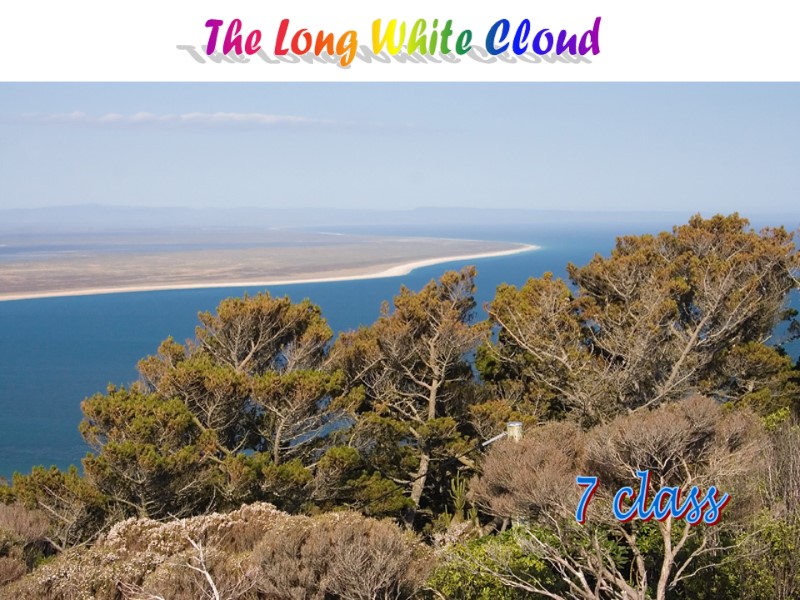
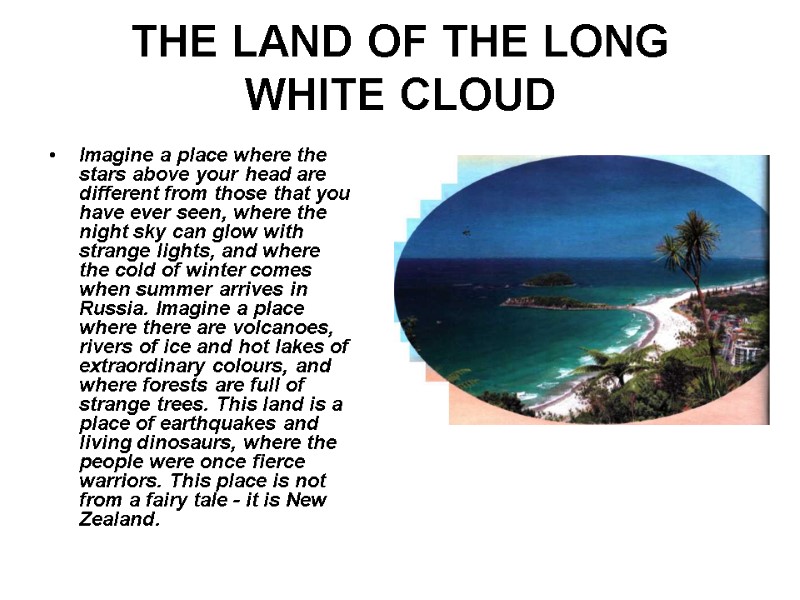
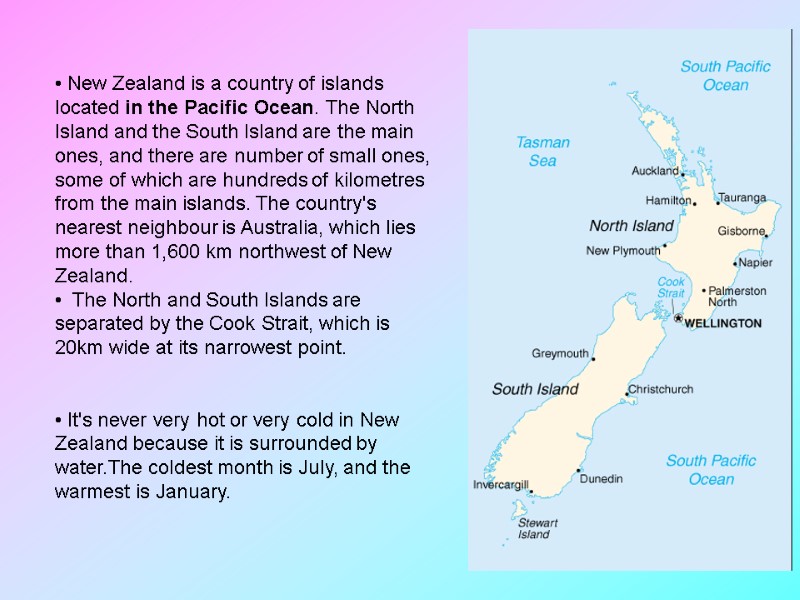
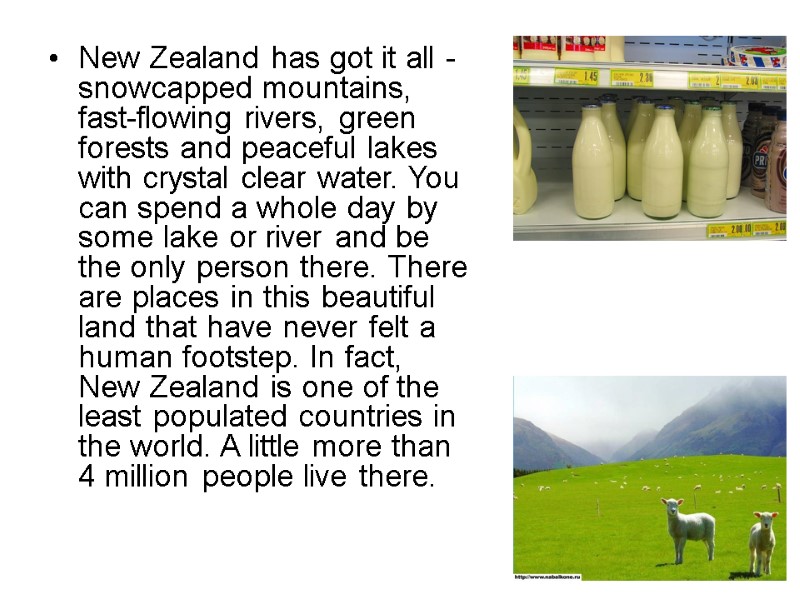
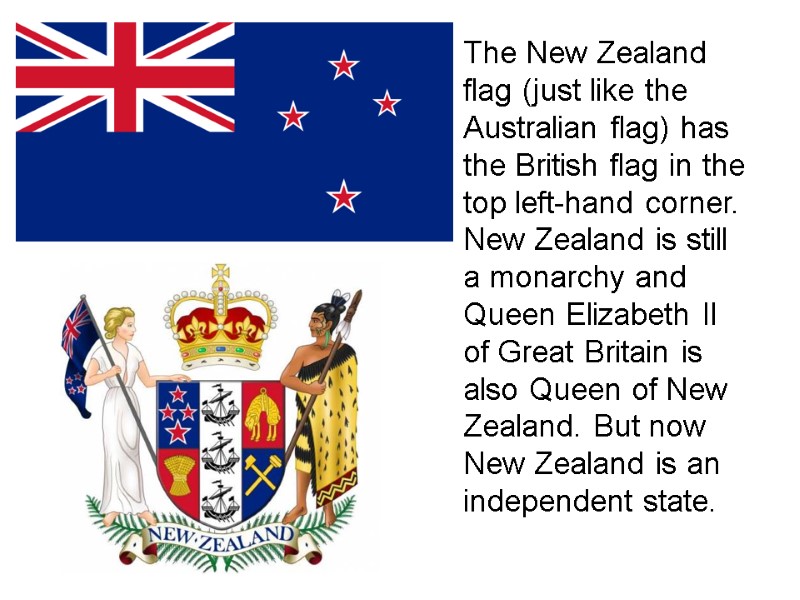
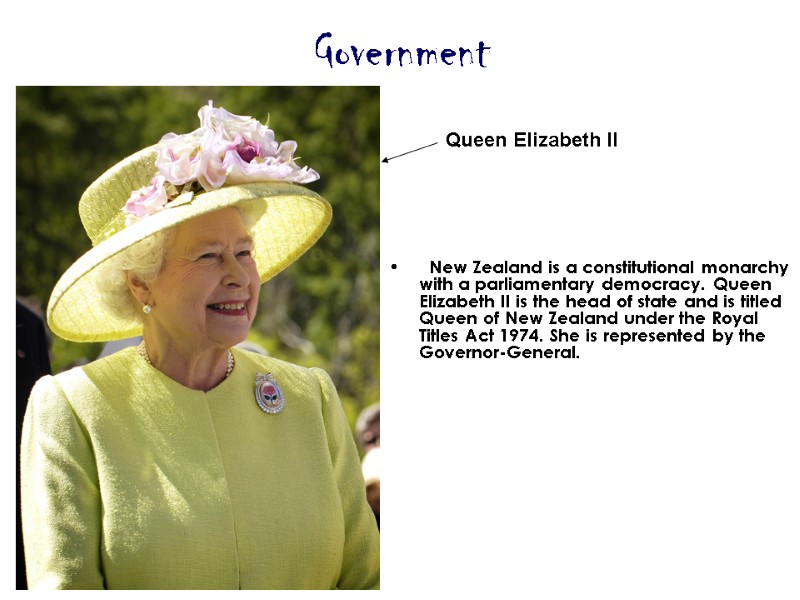
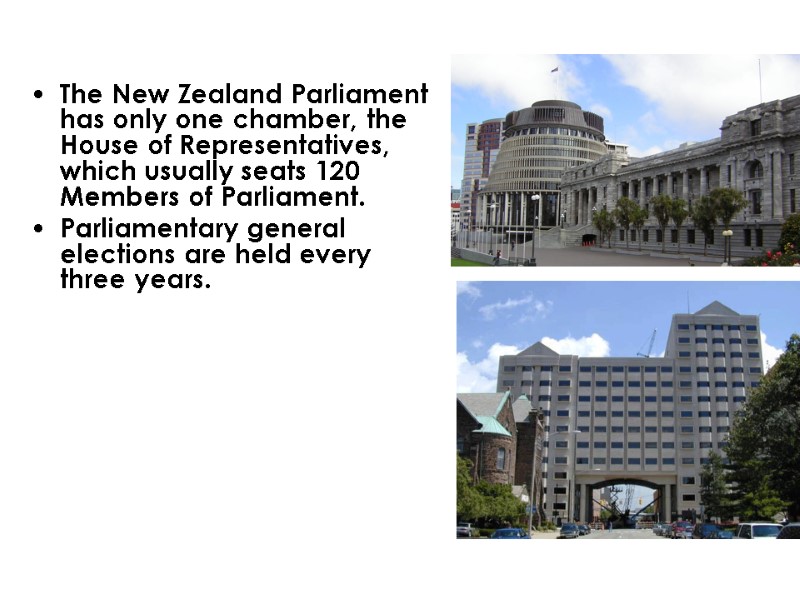
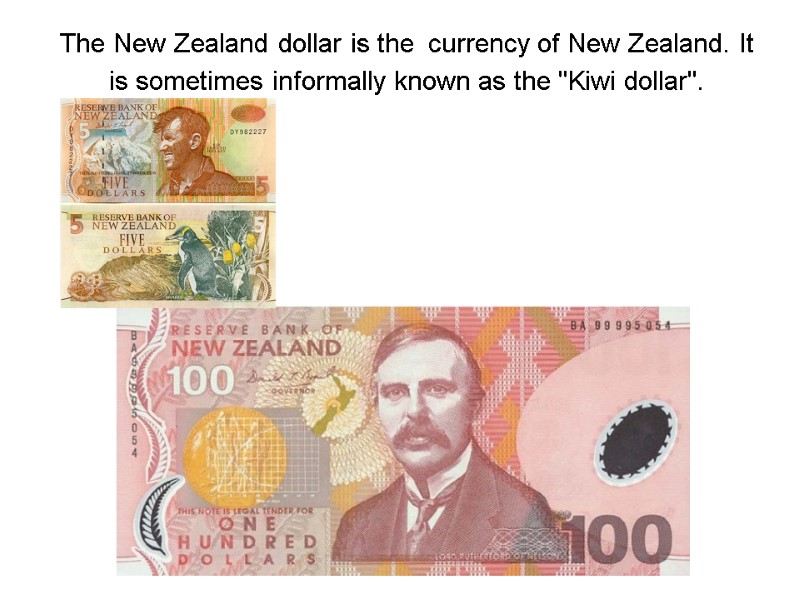
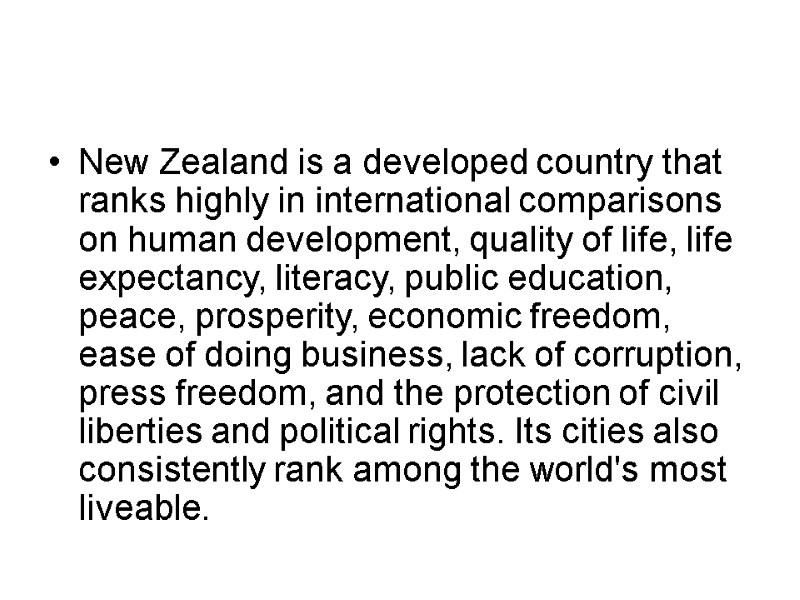
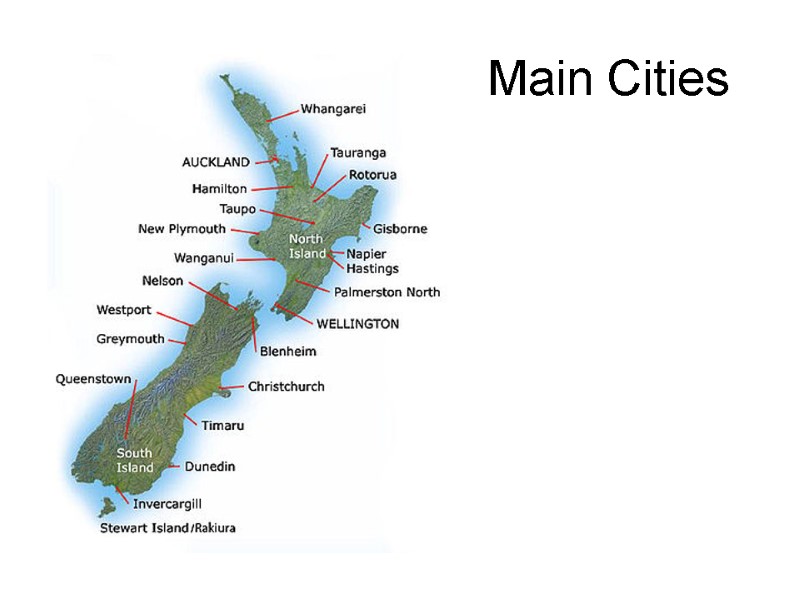
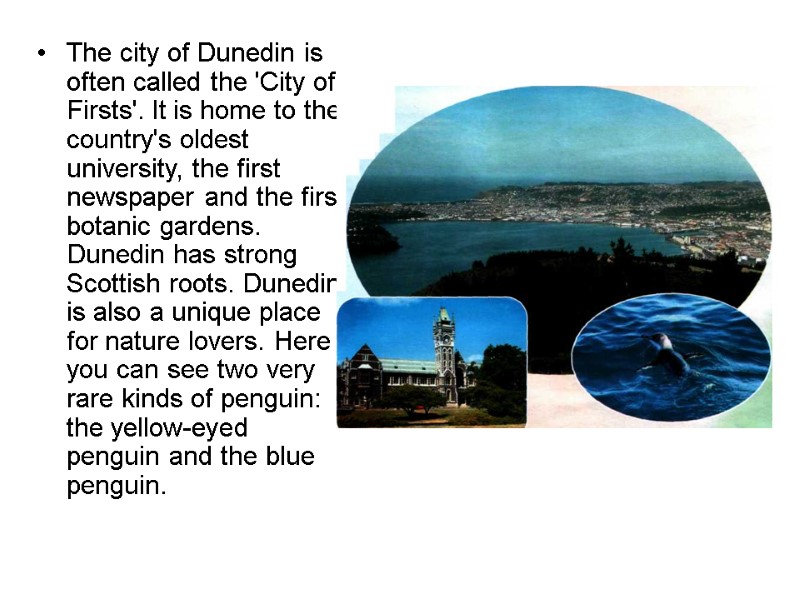
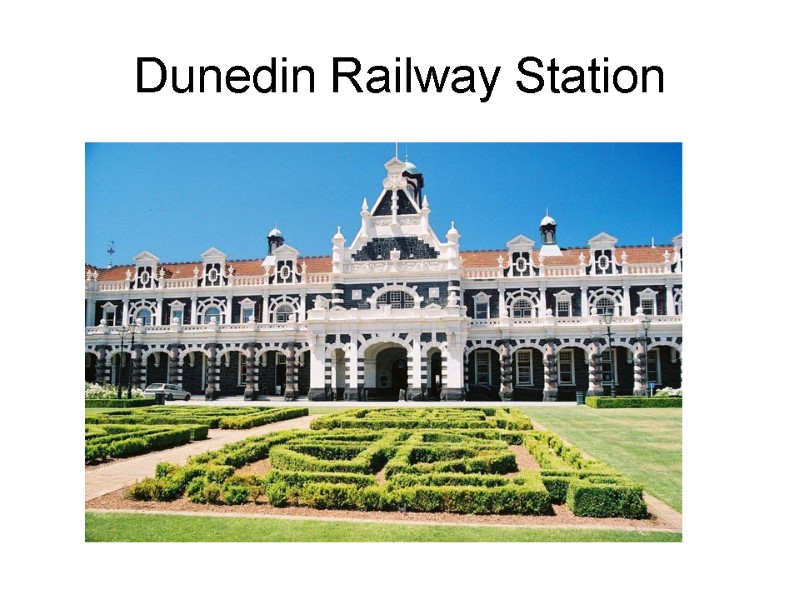
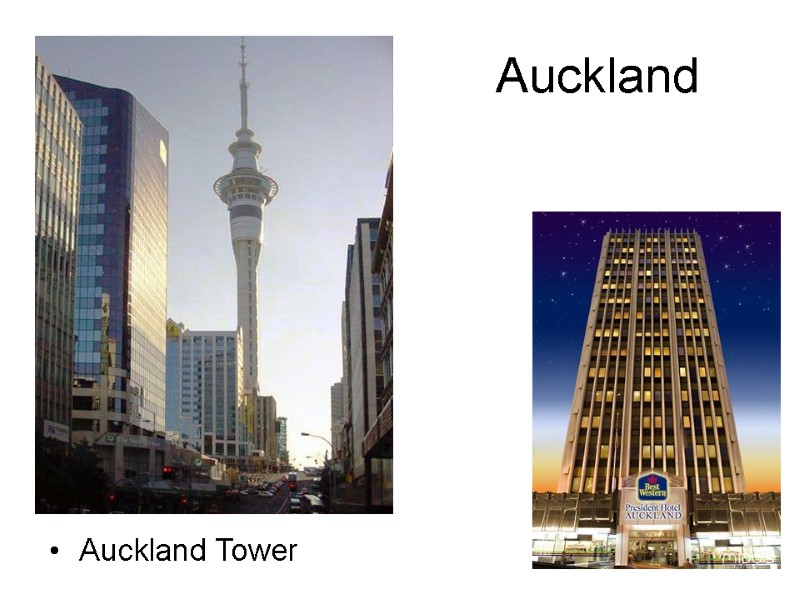
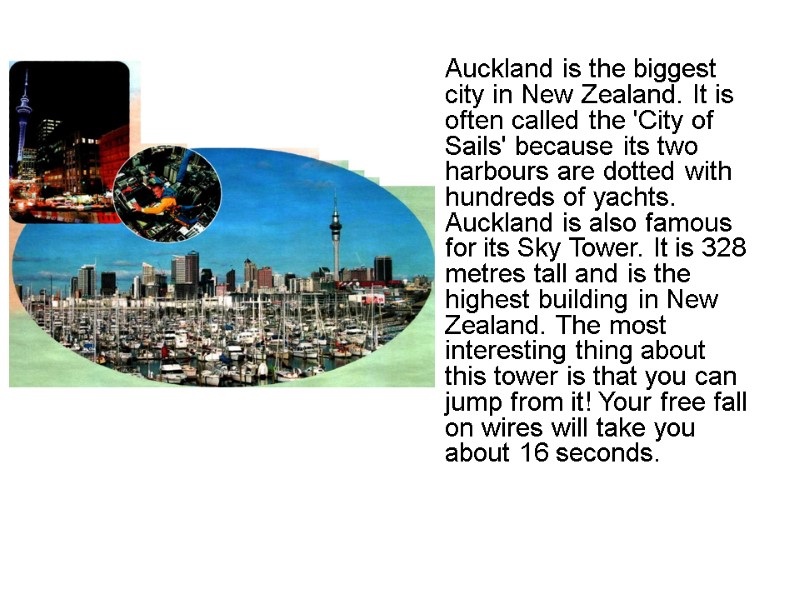
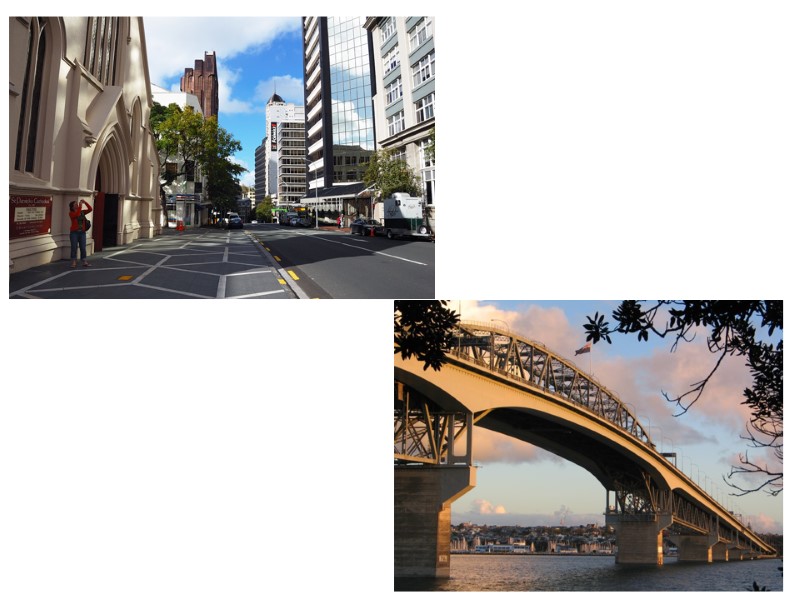
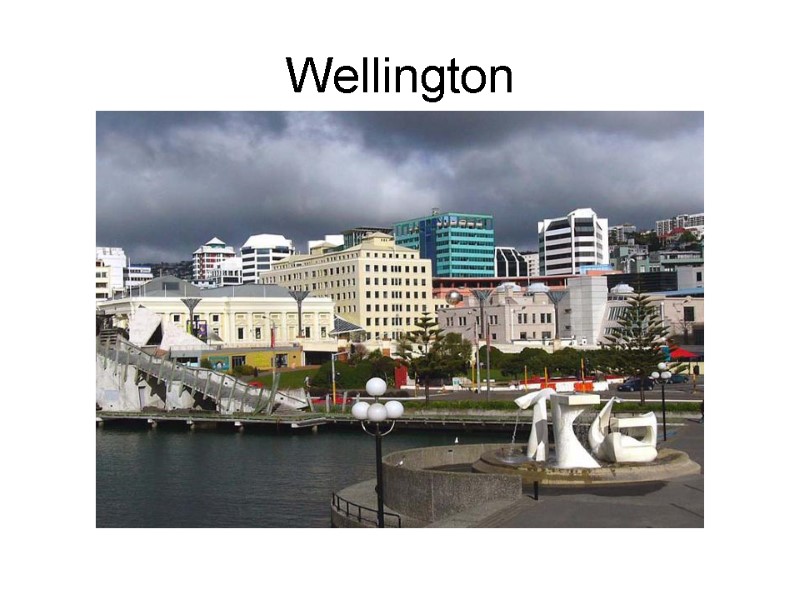
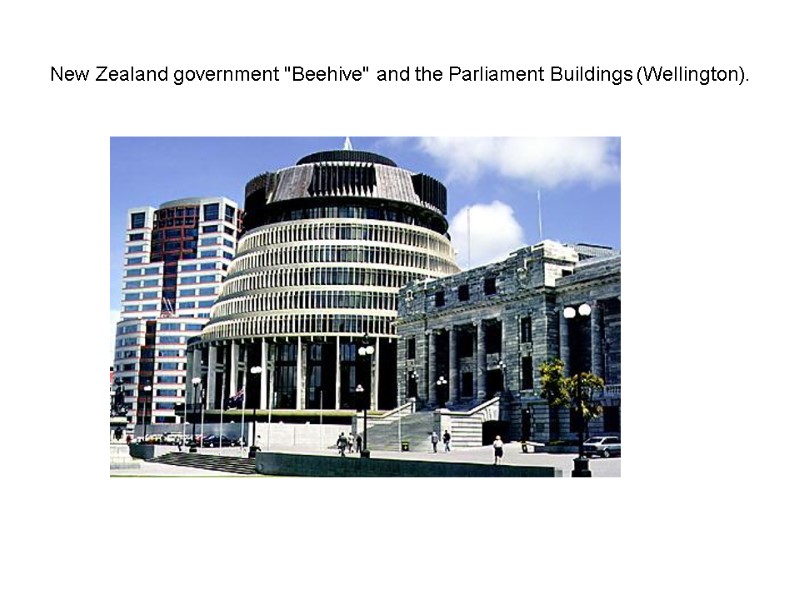
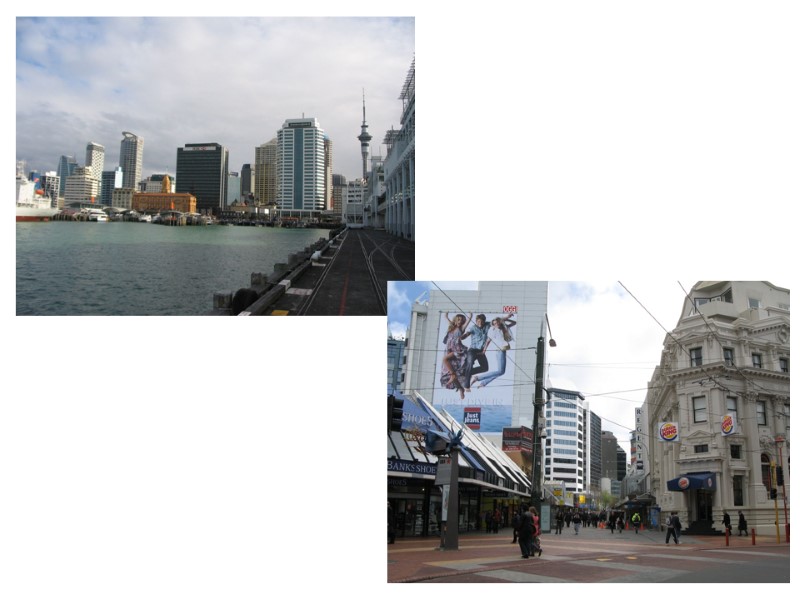
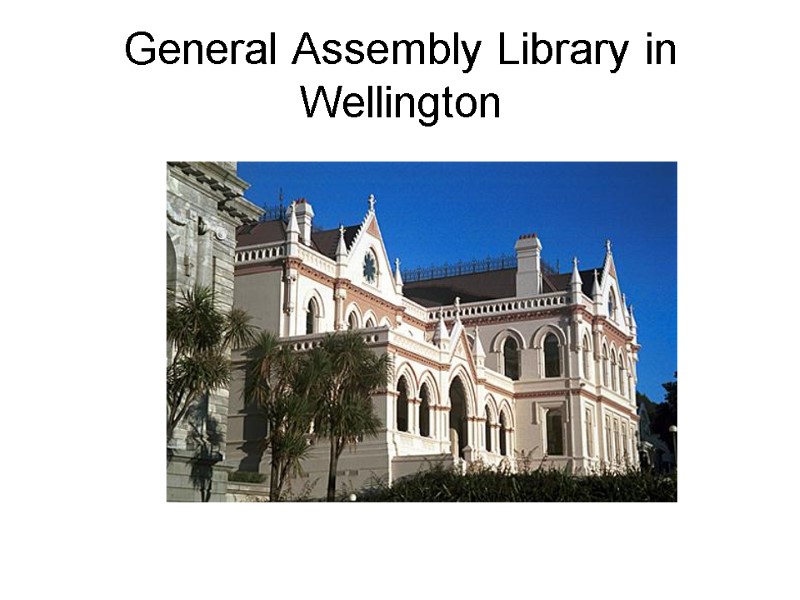
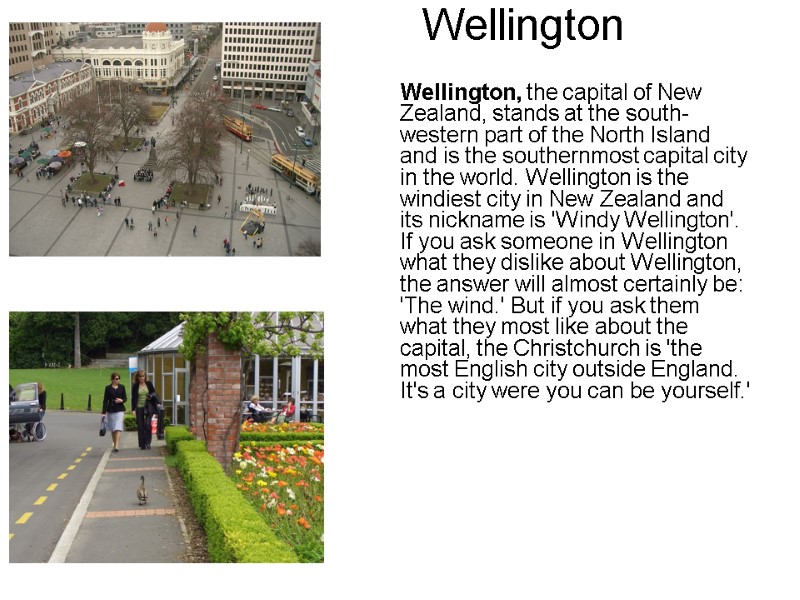
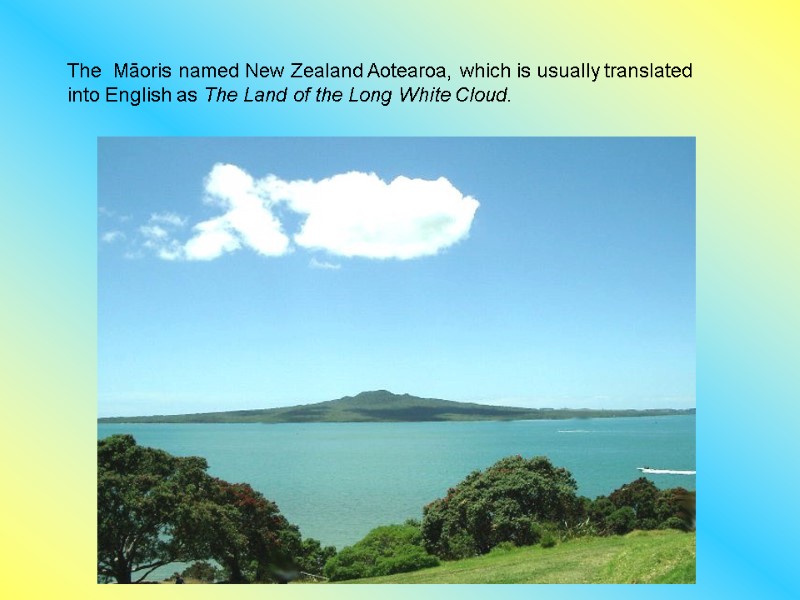
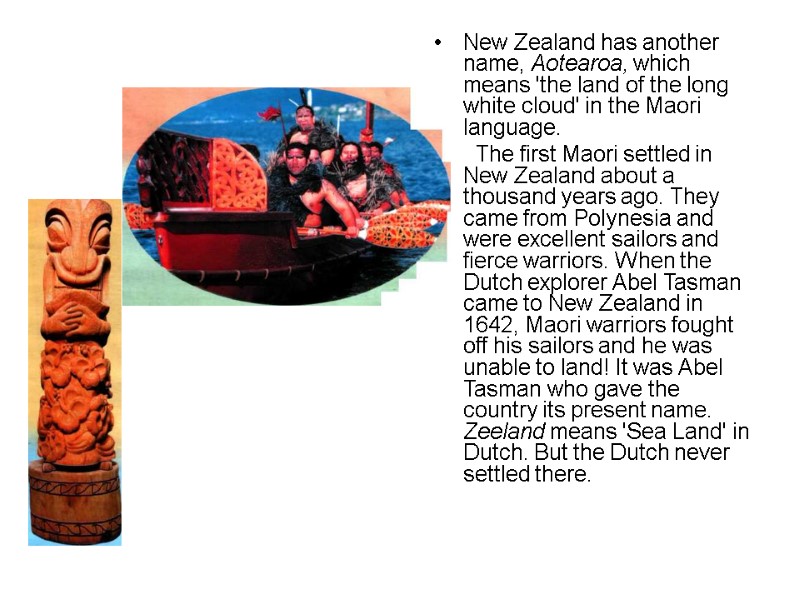
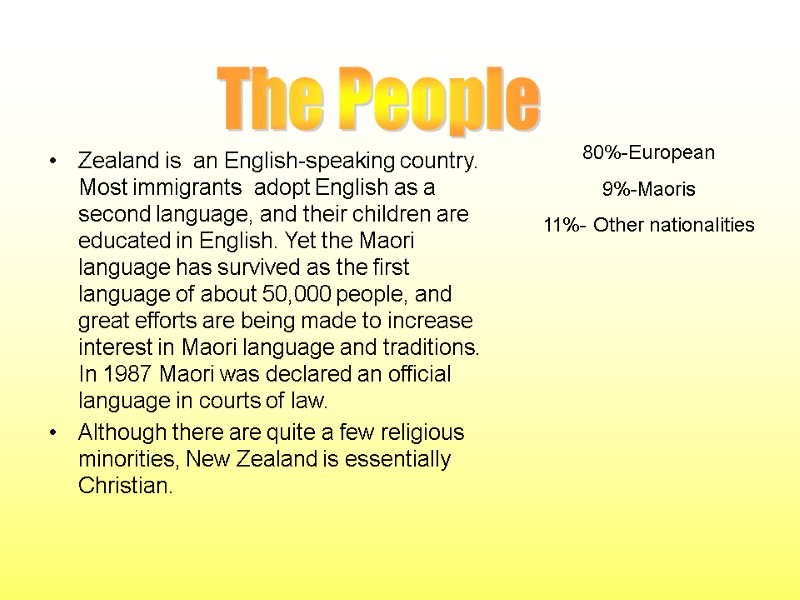
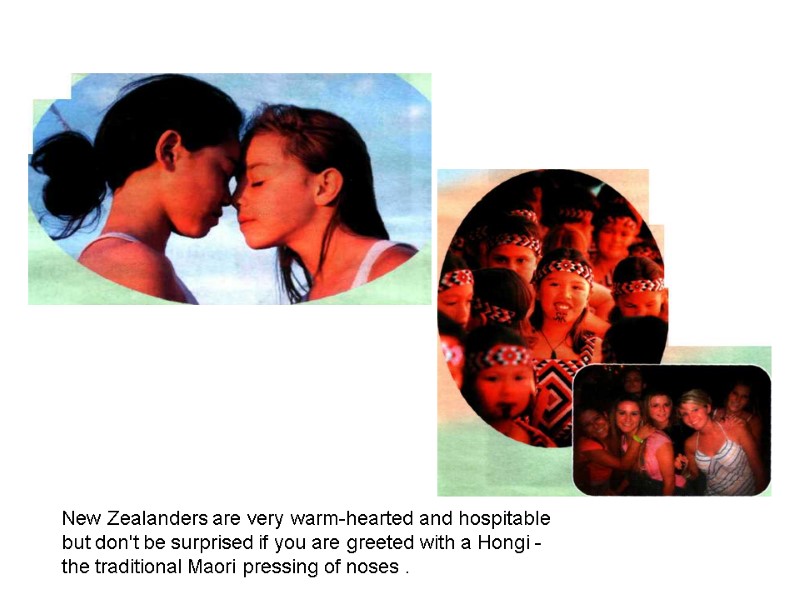
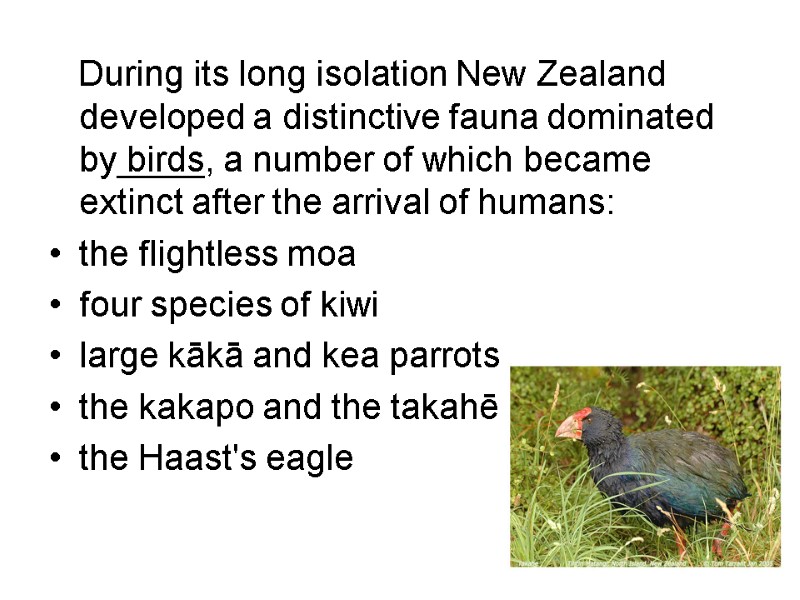
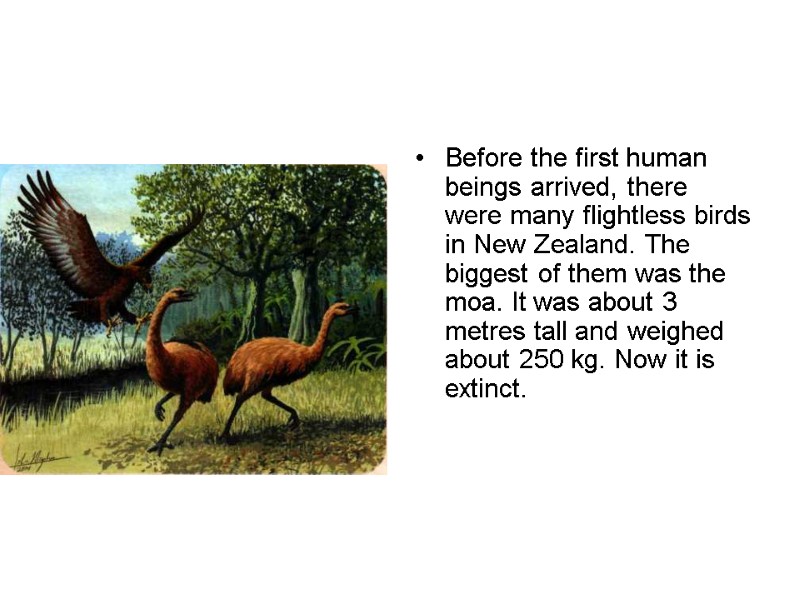
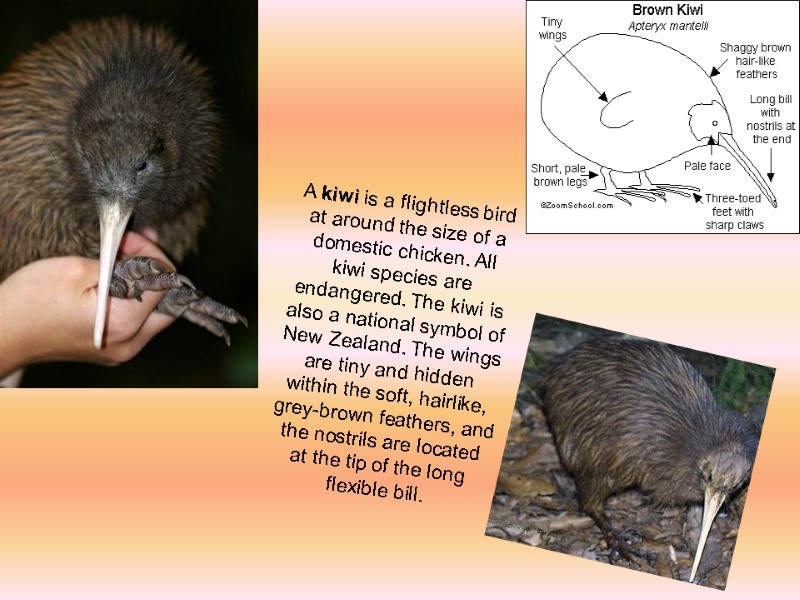
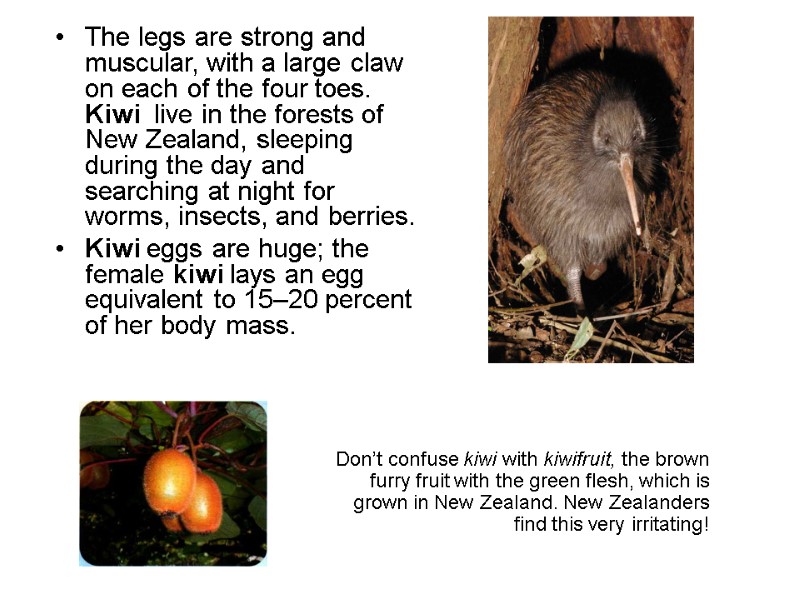
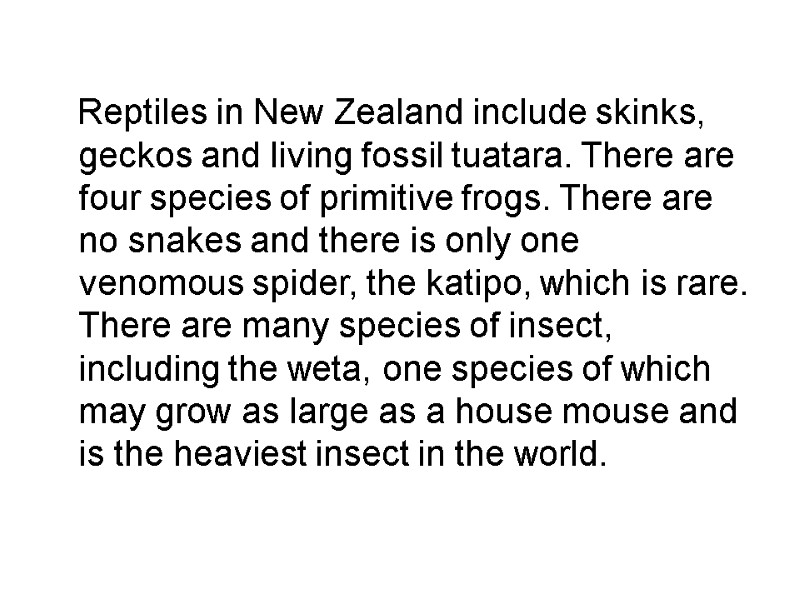
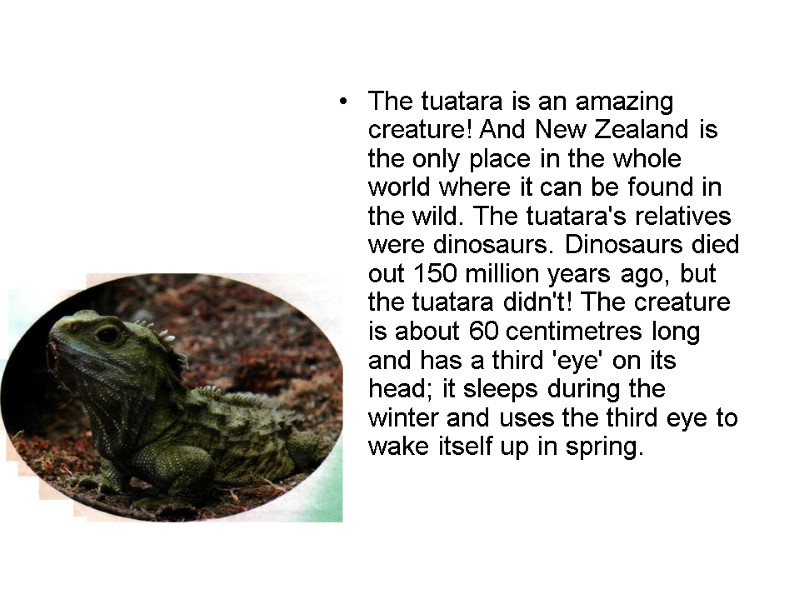
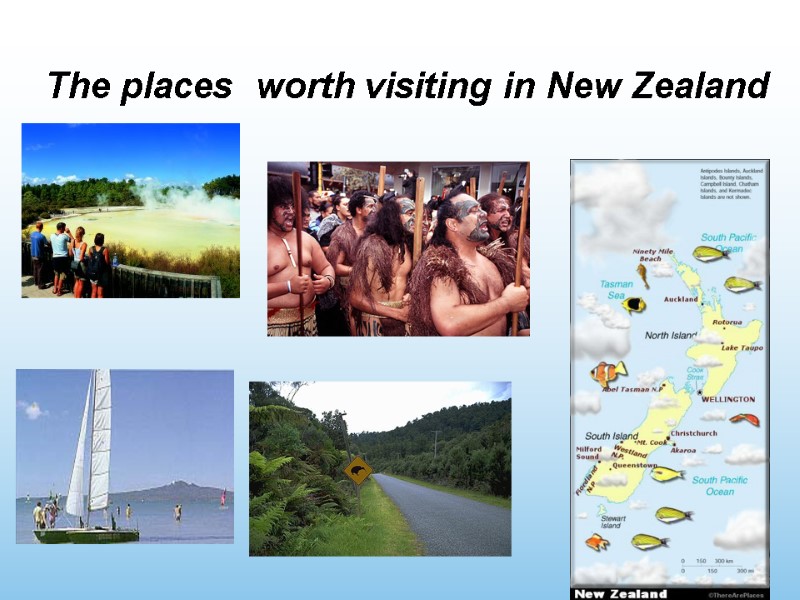
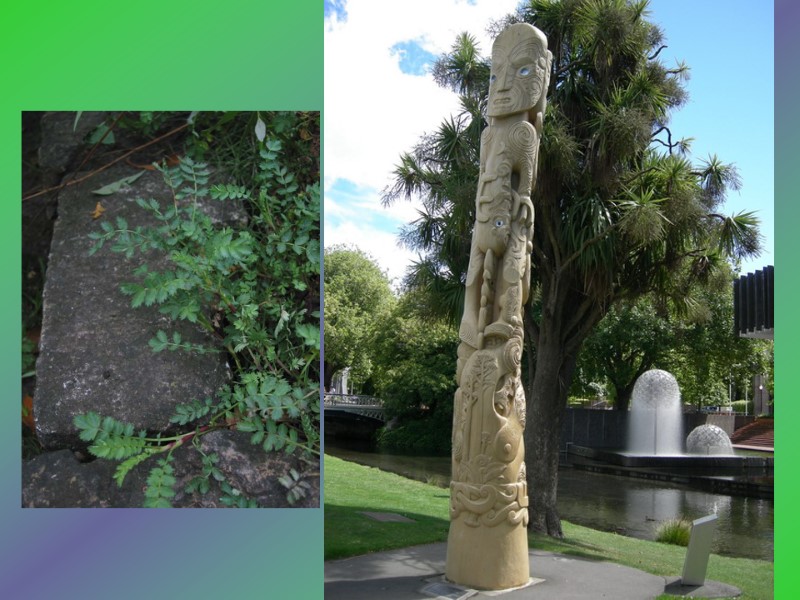
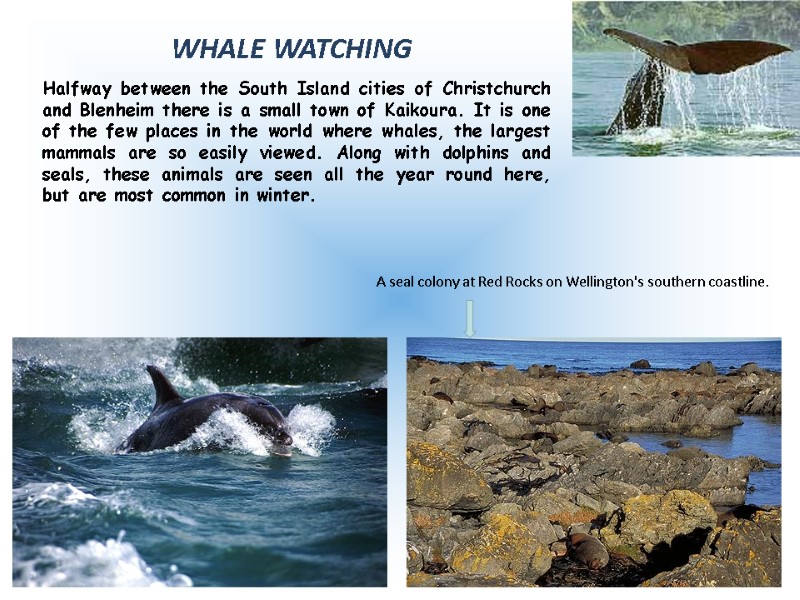
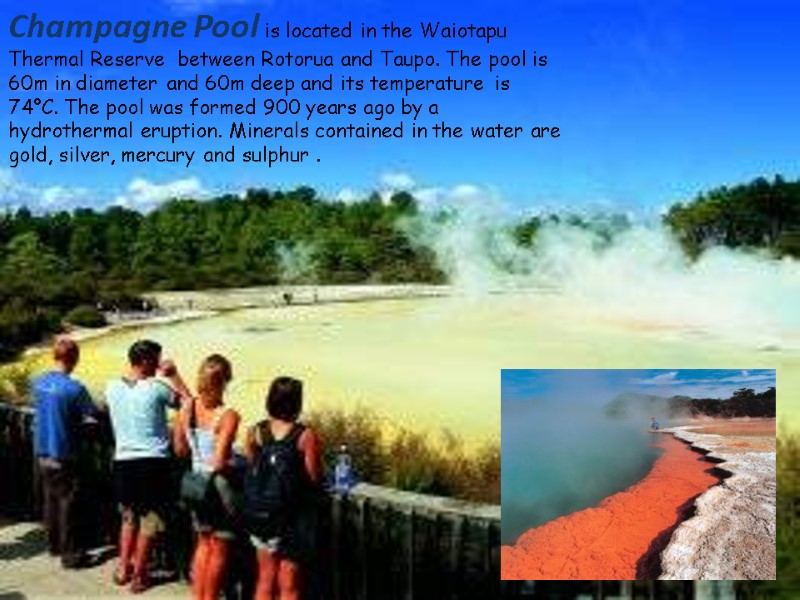
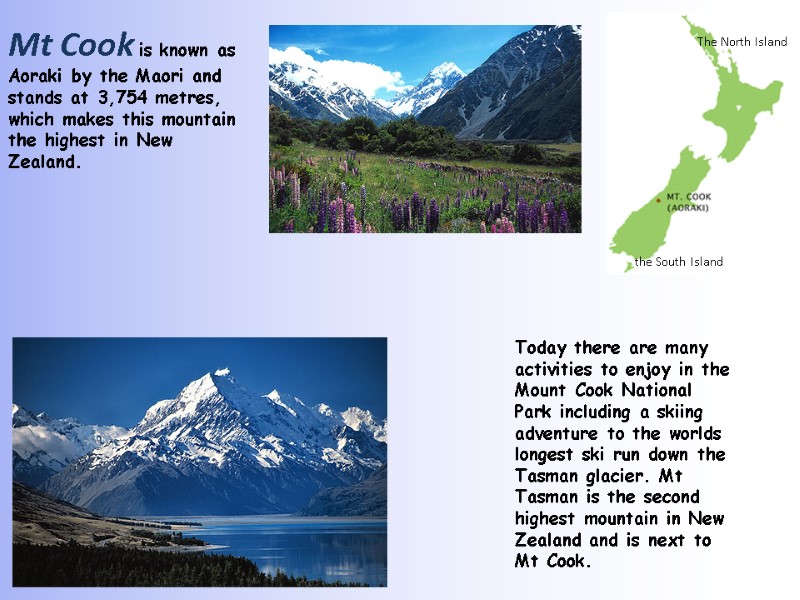
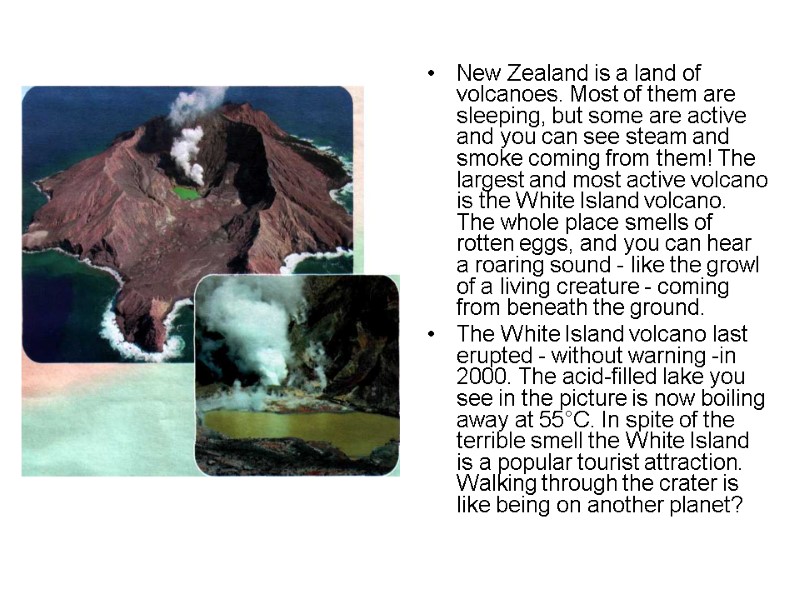
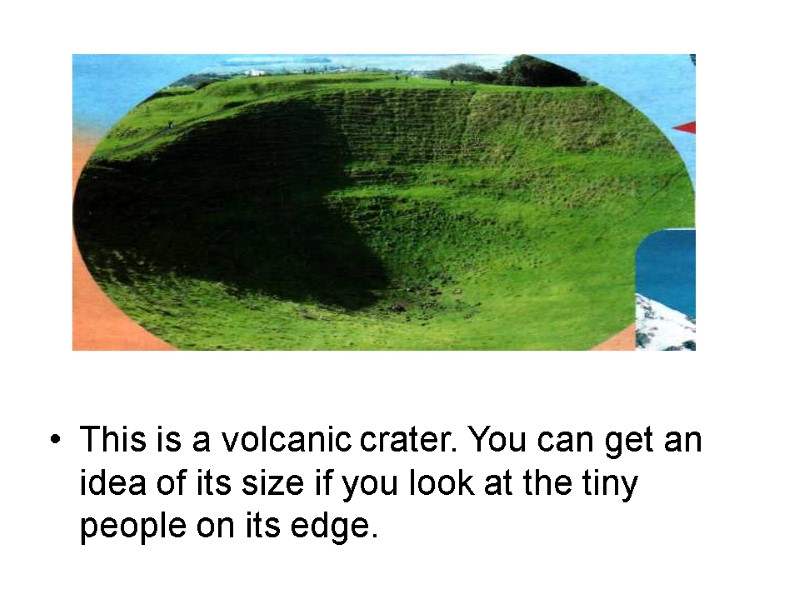
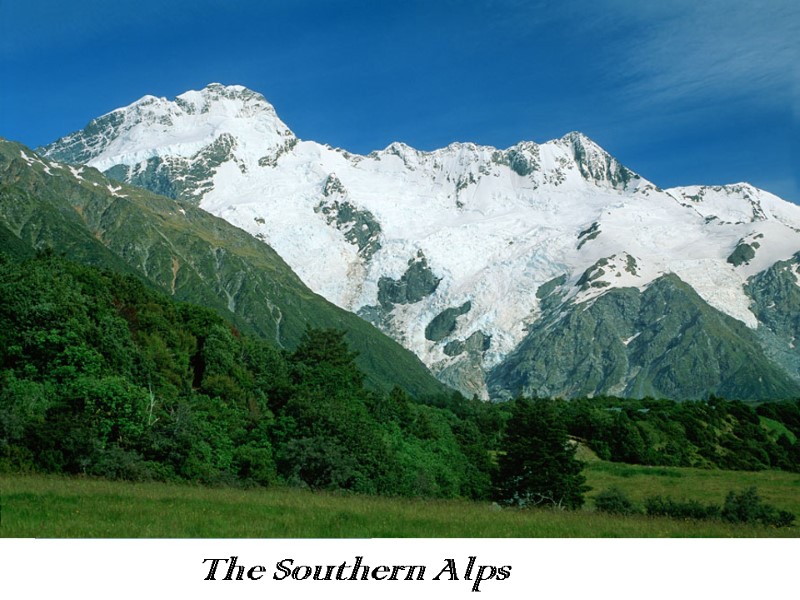
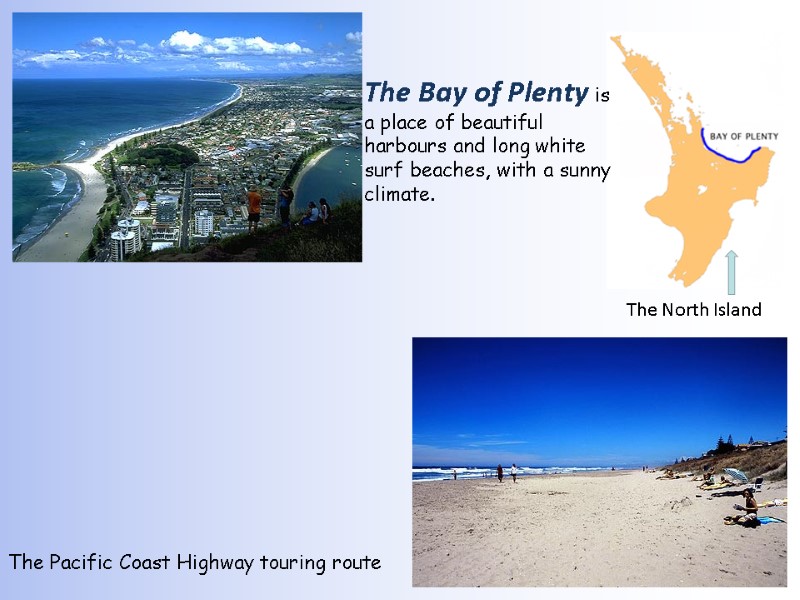
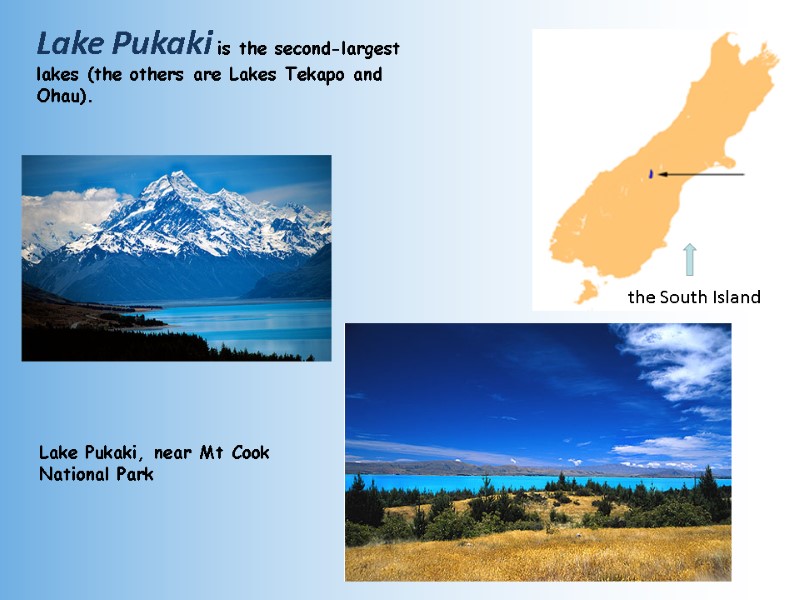
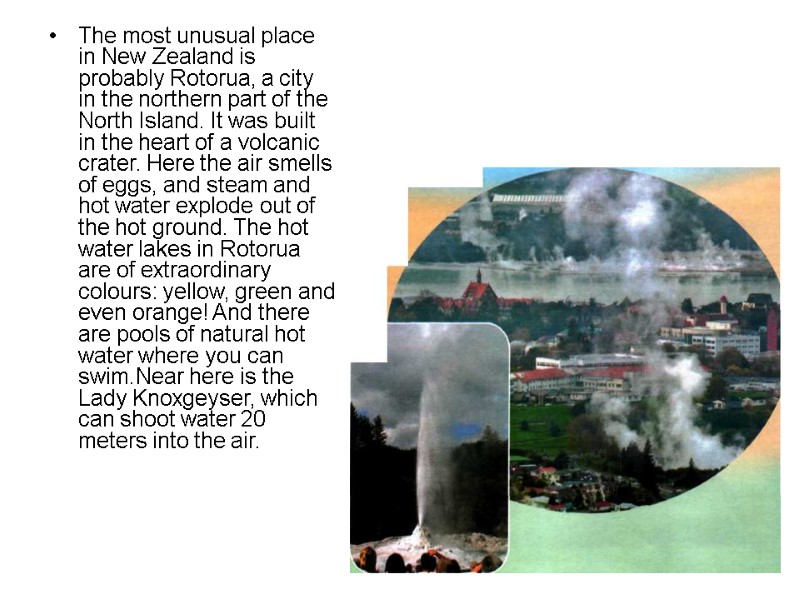
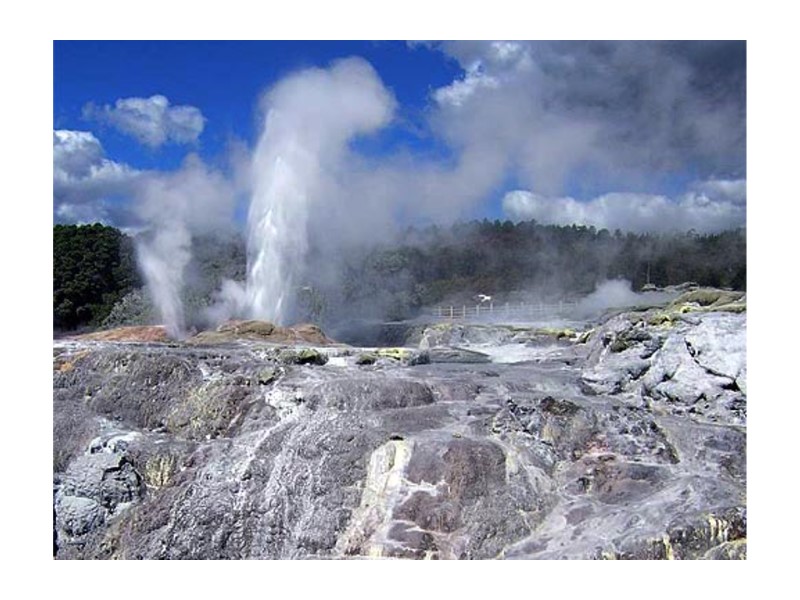
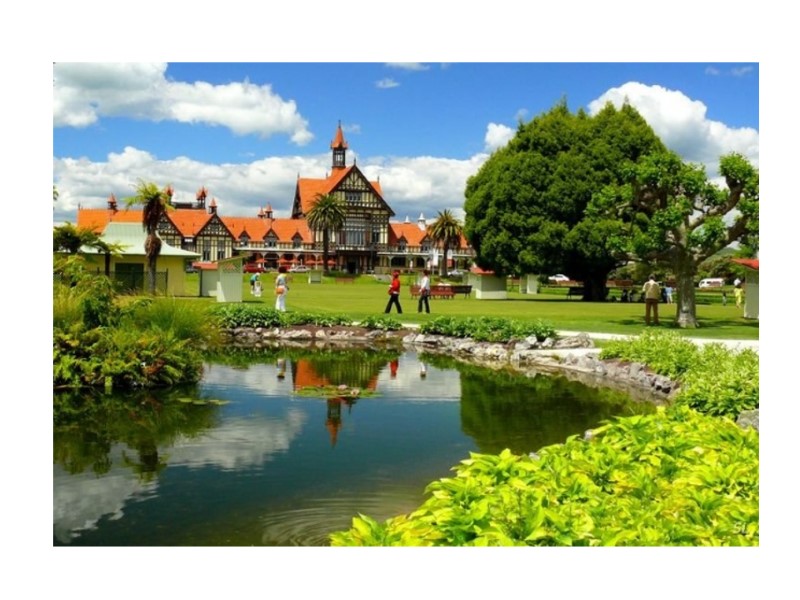
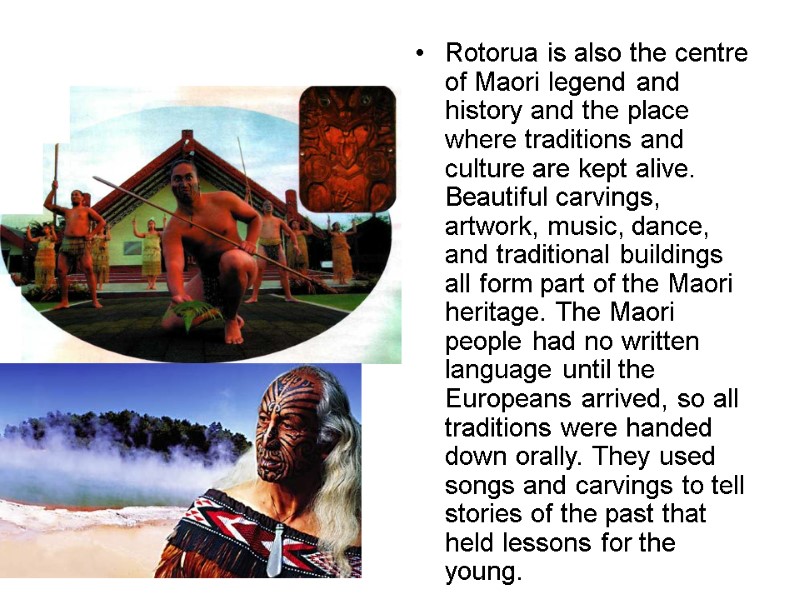
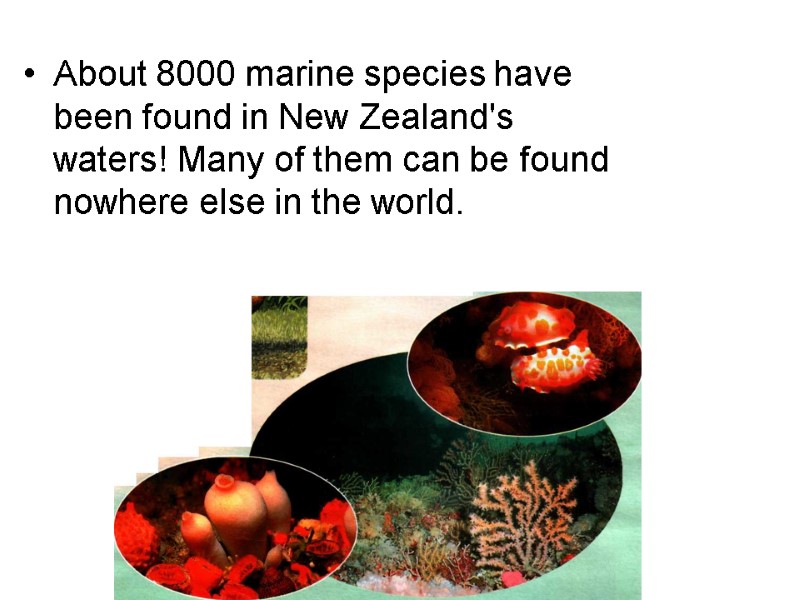
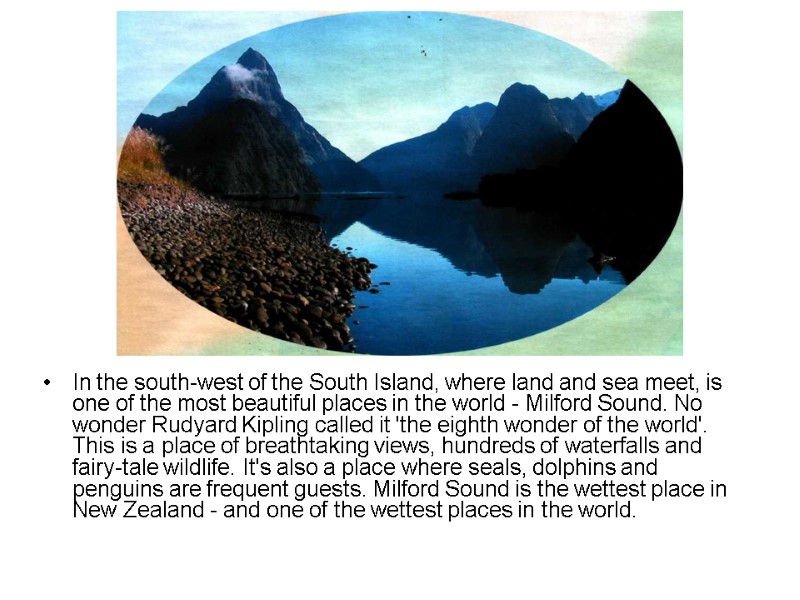
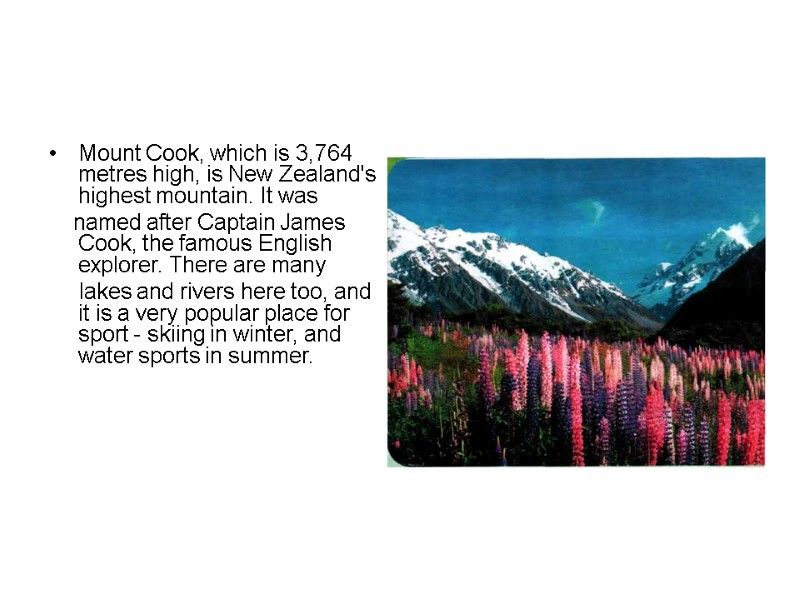
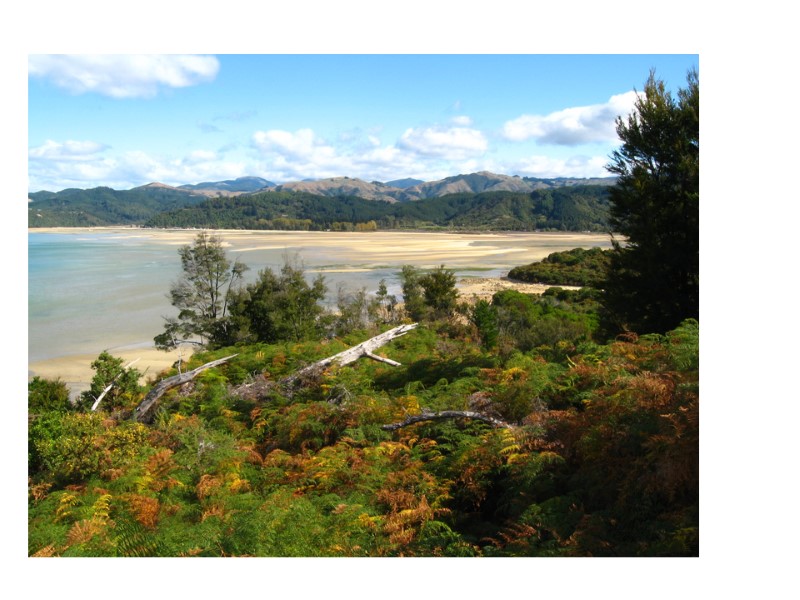
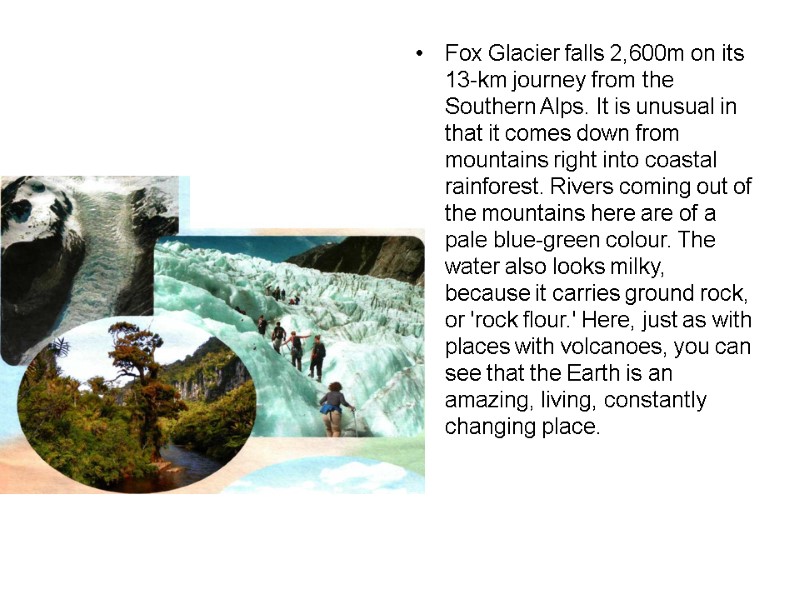
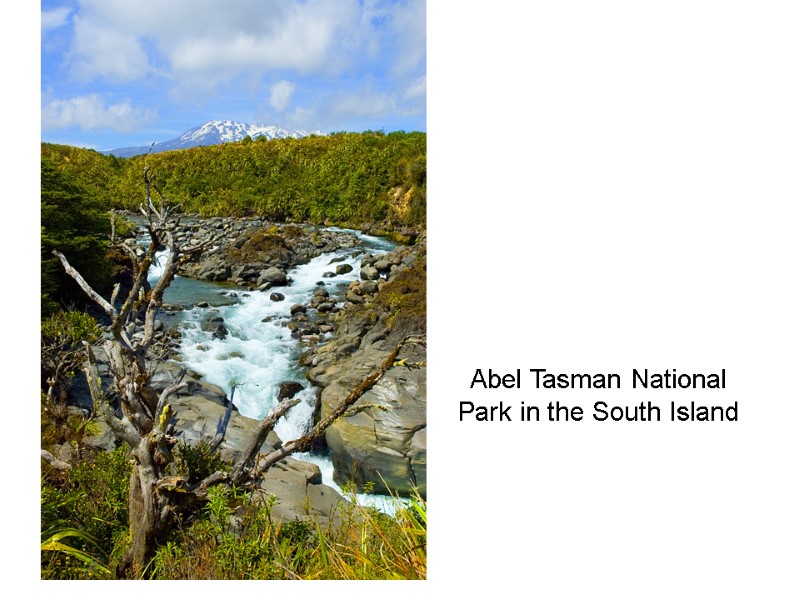
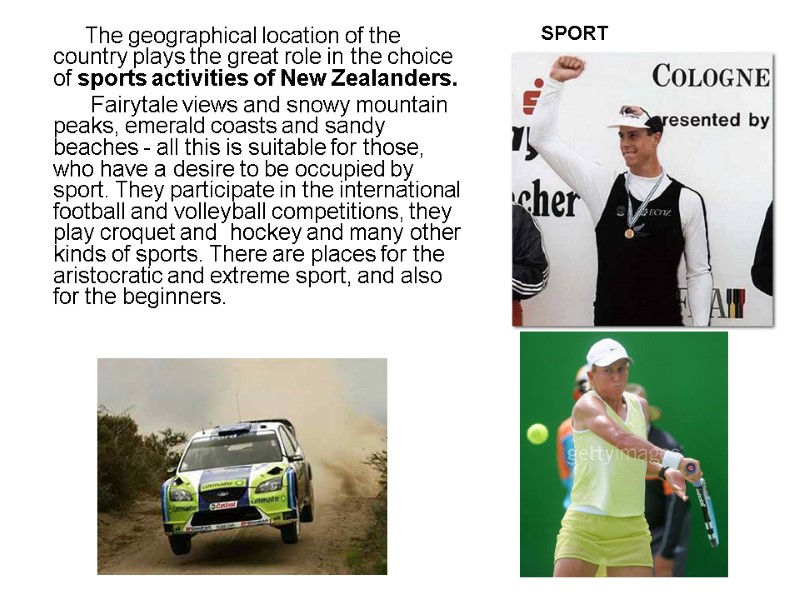
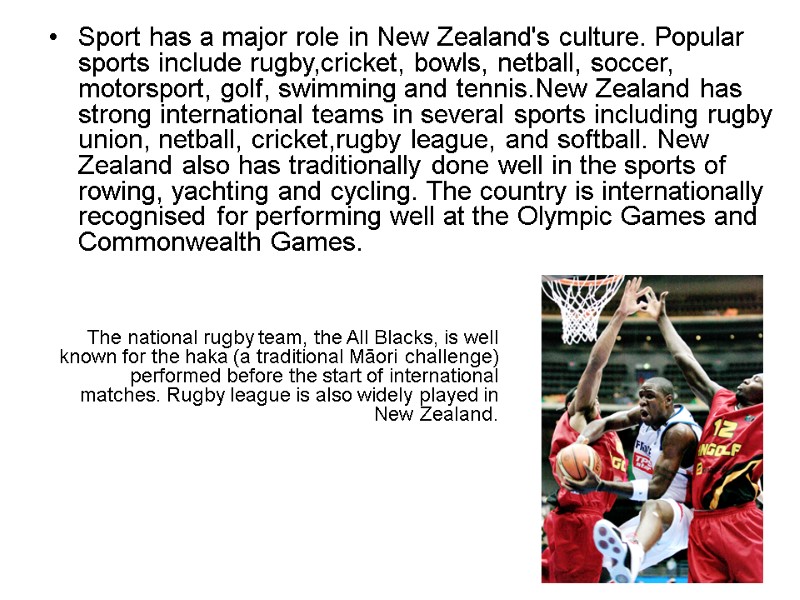
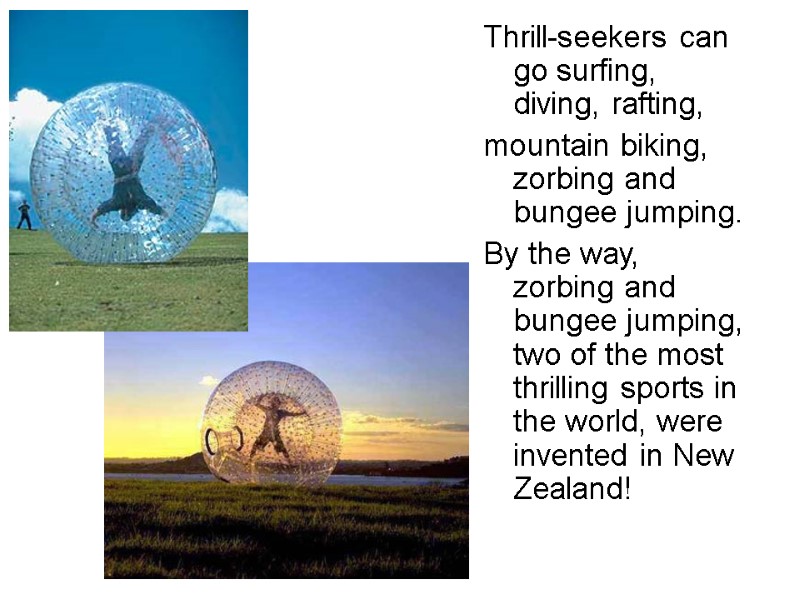
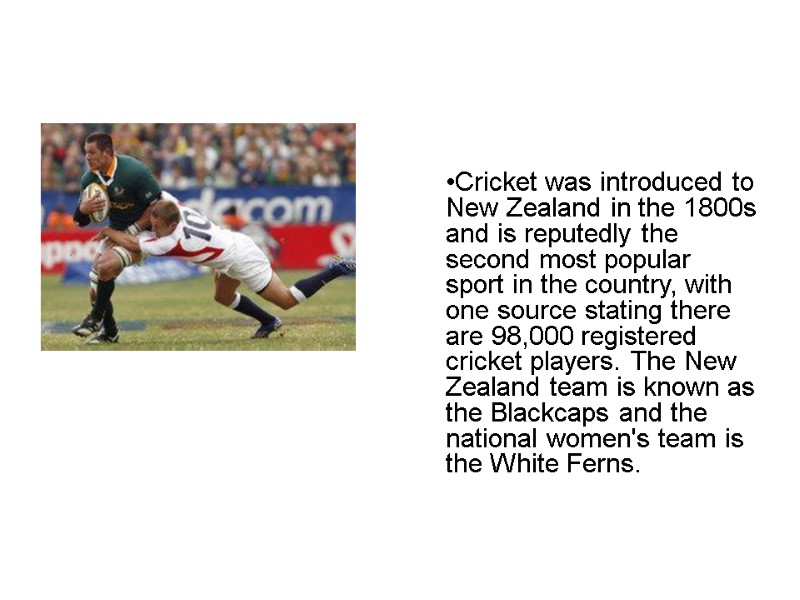
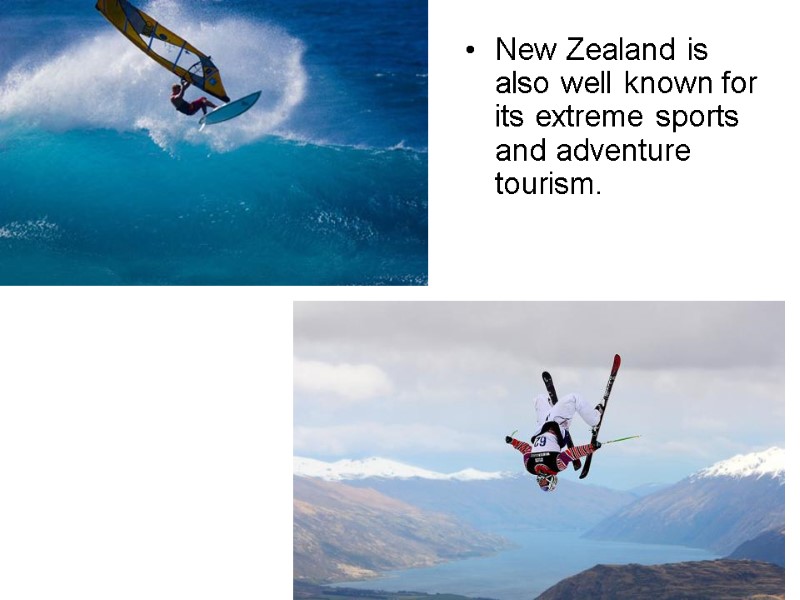
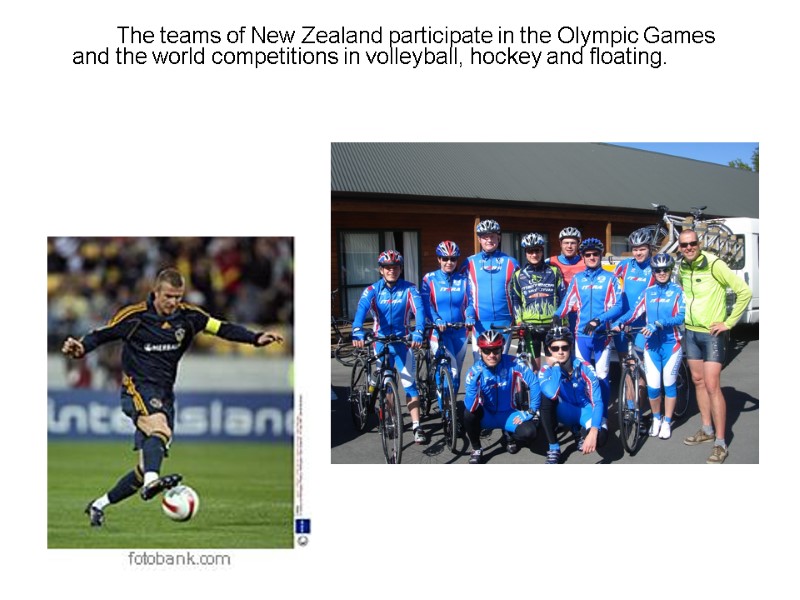
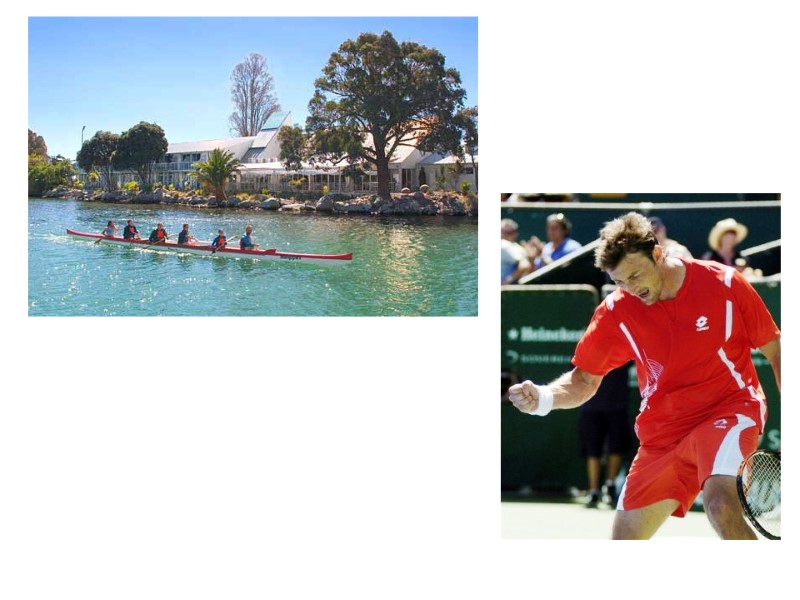
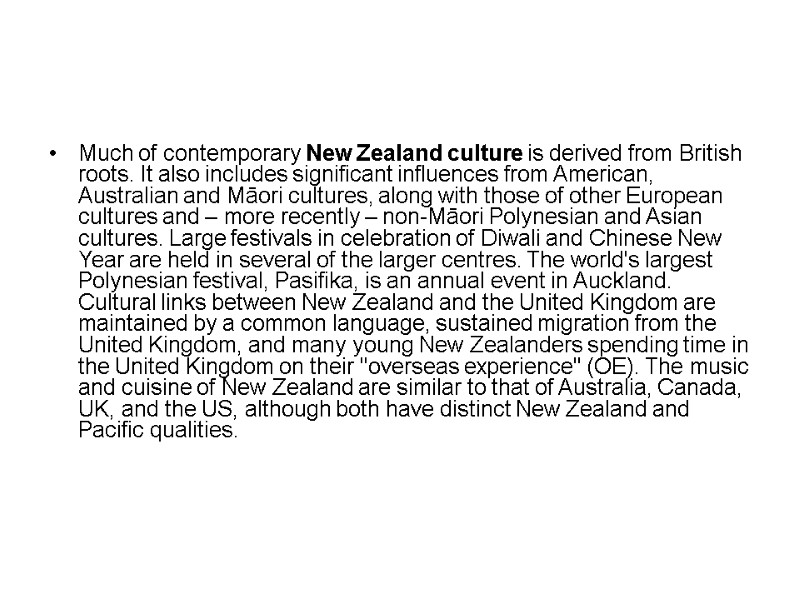
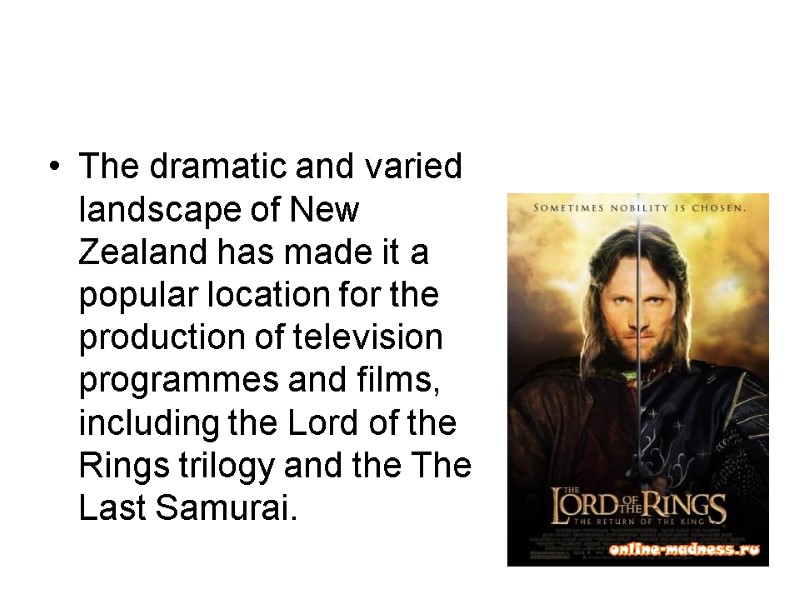
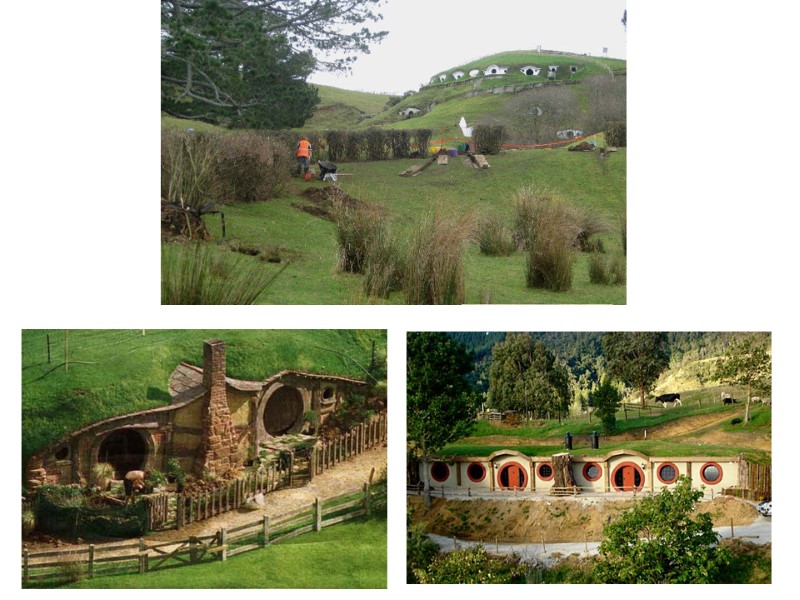
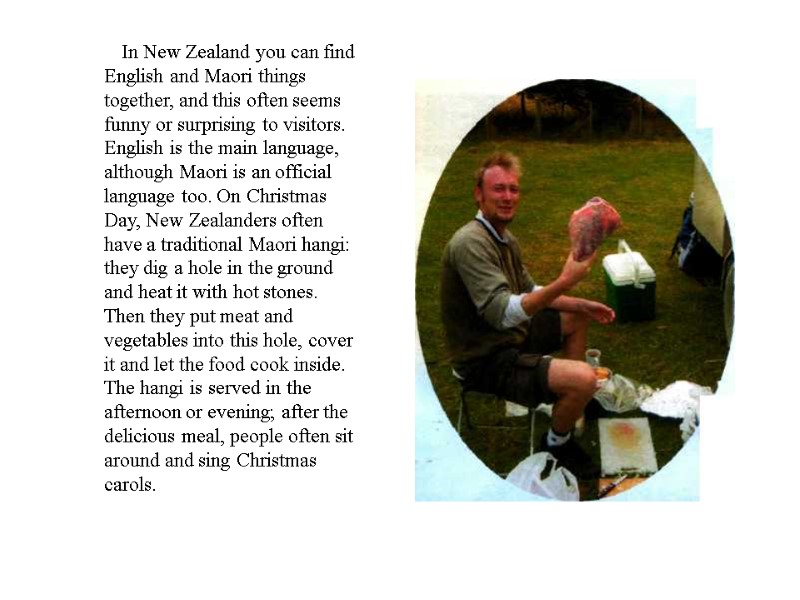
10870-the-land-of-the-long-white-cloud.ppt
- Количество слайдов: 61
 The Long White Cloud 7 class
The Long White Cloud 7 class
 THE LAND OF THE LONG WHITE CLOUD Imagine a place where the stars above your head are different from those that you have ever seen, where the night sky can glow with strange lights, and where the cold of winter comes when summer arrives in Russia. Imagine a place where there are volcanoes, rivers of ice and hot lakes of extraordinary colours, and where forests are full of strange trees. This land is a place of earthquakes and living dinosaurs, where the people were once fierce warriors. This place is not from a fairy tale - it is New Zealand.
THE LAND OF THE LONG WHITE CLOUD Imagine a place where the stars above your head are different from those that you have ever seen, where the night sky can glow with strange lights, and where the cold of winter comes when summer arrives in Russia. Imagine a place where there are volcanoes, rivers of ice and hot lakes of extraordinary colours, and where forests are full of strange trees. This land is a place of earthquakes and living dinosaurs, where the people were once fierce warriors. This place is not from a fairy tale - it is New Zealand.
 New Zealand New Zealand is a country of islands located in the Pacific Ocean. The North Island and the South Island are the main ones, and there are number of small ones, some of which are hundreds of kilometres from the main islands. The country's nearest neighbour is Australia, which lies more than 1,600 km northwest of New Zealand. The North and South Islands are separated by the Cook Strait, which is 20km wide at its narrowest point. It's never very hot or very cold in New Zealand because it is surrounded by water.The coldest month is July, and the warmest is January.
New Zealand New Zealand is a country of islands located in the Pacific Ocean. The North Island and the South Island are the main ones, and there are number of small ones, some of which are hundreds of kilometres from the main islands. The country's nearest neighbour is Australia, which lies more than 1,600 km northwest of New Zealand. The North and South Islands are separated by the Cook Strait, which is 20km wide at its narrowest point. It's never very hot or very cold in New Zealand because it is surrounded by water.The coldest month is July, and the warmest is January.
 New Zealand has got it all - snowcapped mountains, fast-flowing rivers, green forests and peaceful lakes with crystal clear water. You can spend a whole day by some lake or river and be the only person there. There are places in this beautiful land that have never felt a human footstep. In fact, New Zealand is one of the least populated countries in the world. A little more than 4 million people live there.
New Zealand has got it all - snowcapped mountains, fast-flowing rivers, green forests and peaceful lakes with crystal clear water. You can spend a whole day by some lake or river and be the only person there. There are places in this beautiful land that have never felt a human footstep. In fact, New Zealand is one of the least populated countries in the world. A little more than 4 million people live there.
 The New Zealand flag (just like the Australian flag) has the British flag in the top left-hand corner. New Zealand is still a monarchy and Queen Elizabeth II of Great Britain is also Queen of New Zealand. But now New Zealand is an independent state.
The New Zealand flag (just like the Australian flag) has the British flag in the top left-hand corner. New Zealand is still a monarchy and Queen Elizabeth II of Great Britain is also Queen of New Zealand. But now New Zealand is an independent state.
 Government New Zealand is a constitutional monarchy with a parliamentary democracy. Queen Elizabeth II is the head of state and is titled Queen of New Zealand under the Royal Titles Act 1974. She is represented by the Governor-General. Queen Elizabeth II
Government New Zealand is a constitutional monarchy with a parliamentary democracy. Queen Elizabeth II is the head of state and is titled Queen of New Zealand under the Royal Titles Act 1974. She is represented by the Governor-General. Queen Elizabeth II
 The New Zealand Parliament has only one chamber, the House of Representatives, which usually seats 120 Members of Parliament. Parliamentary general elections are held every three years.
The New Zealand Parliament has only one chamber, the House of Representatives, which usually seats 120 Members of Parliament. Parliamentary general elections are held every three years.
 The New Zealand dollar is the currency of New Zealand. It is sometimes informally known as the "Kiwi dollar".
The New Zealand dollar is the currency of New Zealand. It is sometimes informally known as the "Kiwi dollar".
 New Zealand is a developed country that ranks highly in international comparisons on human development, quality of life, life expectancy, literacy, public education, peace, prosperity, economic freedom, ease of doing business, lack of corruption, press freedom, and the protection of civil liberties and political rights. Its cities also consistently rank among the world's most liveable.
New Zealand is a developed country that ranks highly in international comparisons on human development, quality of life, life expectancy, literacy, public education, peace, prosperity, economic freedom, ease of doing business, lack of corruption, press freedom, and the protection of civil liberties and political rights. Its cities also consistently rank among the world's most liveable.
 Main Cities
Main Cities
 The city of Dunedin is often called the 'City of Firsts'. It is home to the country's oldest university, the first newspaper and the first botanic gardens. Dunedin has strong Scottish roots. Dunedin is also a unique place for nature lovers. Here you can see two very rare kinds of penguin: the yellow-eyed penguin and the blue penguin.
The city of Dunedin is often called the 'City of Firsts'. It is home to the country's oldest university, the first newspaper and the first botanic gardens. Dunedin has strong Scottish roots. Dunedin is also a unique place for nature lovers. Here you can see two very rare kinds of penguin: the yellow-eyed penguin and the blue penguin.
 Dunedin Railway Station
Dunedin Railway Station
 Auckland Auckland Tower
Auckland Auckland Tower
 Auckland is the biggest city in New Zealand. It is often called the 'City of Sails' because its two harbours are dotted with hundreds of yachts. Auckland is also famous for its Sky Tower. It is 328 metres tall and is the highest building in New Zealand. The most interesting thing about this tower is that you can jump from it! Your free fall on wires will take you about 16 seconds.
Auckland is the biggest city in New Zealand. It is often called the 'City of Sails' because its two harbours are dotted with hundreds of yachts. Auckland is also famous for its Sky Tower. It is 328 metres tall and is the highest building in New Zealand. The most interesting thing about this tower is that you can jump from it! Your free fall on wires will take you about 16 seconds.

 Wellington
Wellington
 New Zealand government "Beehive" and the Parliament Buildings (Wellington).
New Zealand government "Beehive" and the Parliament Buildings (Wellington).

 General Assembly Library in Wellington
General Assembly Library in Wellington
 Wellington Wellington, the capital of New Zealand, stands at the south-western part of the North Island and is the southernmost capital city in the world. Wellington is the windiest city in New Zealand and its nickname is 'Windy Wellington'. If you ask someone in Wellington what they dislike about Wellington, the answer will almost certainly be: 'The wind.' But if you ask them what they most like about the capital, the Christchurch is 'the most English city outside England. It's a city were you can be yourself.'
Wellington Wellington, the capital of New Zealand, stands at the south-western part of the North Island and is the southernmost capital city in the world. Wellington is the windiest city in New Zealand and its nickname is 'Windy Wellington'. If you ask someone in Wellington what they dislike about Wellington, the answer will almost certainly be: 'The wind.' But if you ask them what they most like about the capital, the Christchurch is 'the most English city outside England. It's a city were you can be yourself.'
 The Māoris named New Zealand Aotearoa, which is usually translated into English as The Land of the Long White Cloud.
The Māoris named New Zealand Aotearoa, which is usually translated into English as The Land of the Long White Cloud.
 New Zealand has another name, Aotearoa, which means 'the land of the long white cloud' in the Maori language. The first Maori settled in New Zealand about a thousand years ago. They came from Polynesia and were excellent sailors and fierce warriors. When the Dutch explorer Abel Tasman came to New Zealand in 1642, Maori warriors fought off his sailors and he was unable to land! It was Abel Tasman who gave the country its present name. Zeeland means 'Sea Land' in Dutch. But the Dutch never settled there.
New Zealand has another name, Aotearoa, which means 'the land of the long white cloud' in the Maori language. The first Maori settled in New Zealand about a thousand years ago. They came from Polynesia and were excellent sailors and fierce warriors. When the Dutch explorer Abel Tasman came to New Zealand in 1642, Maori warriors fought off his sailors and he was unable to land! It was Abel Tasman who gave the country its present name. Zeeland means 'Sea Land' in Dutch. But the Dutch never settled there.
 The People 80%-European 9%-Maoris 11%- Other nationalities Zealand is an English-speaking country. Most immigrants adopt English as a second language, and their children are educated in English. Yet the Maori language has survived as the first language of about 50,000 people, and great efforts are being made to increase interest in Maori language and traditions. In 1987 Maori was declared an official language in courts of law. Although there are quite a few religious minorities, New Zealand is essentially Christian.
The People 80%-European 9%-Maoris 11%- Other nationalities Zealand is an English-speaking country. Most immigrants adopt English as a second language, and their children are educated in English. Yet the Maori language has survived as the first language of about 50,000 people, and great efforts are being made to increase interest in Maori language and traditions. In 1987 Maori was declared an official language in courts of law. Although there are quite a few religious minorities, New Zealand is essentially Christian.
 New Zealanders are very warm-hearted and hospitable but don't be surprised if you are greeted with a Hongi -the traditional Maori pressing of noses .
New Zealanders are very warm-hearted and hospitable but don't be surprised if you are greeted with a Hongi -the traditional Maori pressing of noses .
 During its long isolation New Zealand developed a distinctive fauna dominated by birds, a number of which became extinct after the arrival of humans: the flightless moa four species of kiwi large kākā and kea parrots the kakapo and the takahē the Haast's eagle
During its long isolation New Zealand developed a distinctive fauna dominated by birds, a number of which became extinct after the arrival of humans: the flightless moa four species of kiwi large kākā and kea parrots the kakapo and the takahē the Haast's eagle
 Before the first human beings arrived, there were many flightless birds in New Zealand. The biggest of them was the moa. It was about 3 metres tall and weighed about 250 kg. Now it is extinct.
Before the first human beings arrived, there were many flightless birds in New Zealand. The biggest of them was the moa. It was about 3 metres tall and weighed about 250 kg. Now it is extinct.
 A kiwi is a flightless bird at around the size of a domestic chicken. All kiwi species are endangered. The kiwi is also a national symbol of New Zealand. The wings are tiny and hidden within the soft, hairlike, grey-brown feathers, and the nostrils are located at the tip of the long flexible bill.
A kiwi is a flightless bird at around the size of a domestic chicken. All kiwi species are endangered. The kiwi is also a national symbol of New Zealand. The wings are tiny and hidden within the soft, hairlike, grey-brown feathers, and the nostrils are located at the tip of the long flexible bill.
 The legs are strong and muscular, with a large claw on each of the four toes. Kiwi live in the forests of New Zealand, sleeping during the day and searching at night for worms, insects, and berries. Kiwi eggs are huge; the female kiwi lays an egg equivalent to 15–20 percent of her body mass. Don’t confuse kiwi with kiwifruit, the brown furry fruit with the green flesh, which is grown in New Zealand. New Zealanders find this very irritating!
The legs are strong and muscular, with a large claw on each of the four toes. Kiwi live in the forests of New Zealand, sleeping during the day and searching at night for worms, insects, and berries. Kiwi eggs are huge; the female kiwi lays an egg equivalent to 15–20 percent of her body mass. Don’t confuse kiwi with kiwifruit, the brown furry fruit with the green flesh, which is grown in New Zealand. New Zealanders find this very irritating!
 Reptiles in New Zealand include skinks, geckos and living fossil tuatara. There are four species of primitive frogs. There are no snakes and there is only one venomous spider, the katipo, which is rare. There are many species of insect, including the weta, one species of which may grow as large as a house mouse and is the heaviest insect in the world.
Reptiles in New Zealand include skinks, geckos and living fossil tuatara. There are four species of primitive frogs. There are no snakes and there is only one venomous spider, the katipo, which is rare. There are many species of insect, including the weta, one species of which may grow as large as a house mouse and is the heaviest insect in the world.
 The tuatara is an amazing creature! And New Zealand is the only place in the whole world where it can be found in the wild. The tuatara's relatives were dinosaurs. Dinosaurs died out 150 million years ago, but the tuatara didn't! The creature is about 60 centimetres long and has a third 'eye' on its head; it sleeps during the winter and uses the third eye to wake itself up in spring.
The tuatara is an amazing creature! And New Zealand is the only place in the whole world where it can be found in the wild. The tuatara's relatives were dinosaurs. Dinosaurs died out 150 million years ago, but the tuatara didn't! The creature is about 60 centimetres long and has a third 'eye' on its head; it sleeps during the winter and uses the third eye to wake itself up in spring.
 The places worth visiting in New Zealand
The places worth visiting in New Zealand
 The culture of New Zealand is rich and diverse. The elements of European, Polynesian and Asian cultural traditions were reflected in it. But the life of New Zealand is rich not only in cultural traditions. Architecture, symphonic and contemporary music, theatre and cinema and literature - all this is developed and maintained on the highest standards.
The culture of New Zealand is rich and diverse. The elements of European, Polynesian and Asian cultural traditions were reflected in it. But the life of New Zealand is rich not only in cultural traditions. Architecture, symphonic and contemporary music, theatre and cinema and literature - all this is developed and maintained on the highest standards.
 Halfway between the South Island cities of Christchurch and Blenheim there is a small town of Kaikoura. It is one of the few places in the world where whales, the largest mammals are so easily viewed. Along with dolphins and seals, these animals are seen all the year round here, but are most common in winter. WHALE WATCHING A seal colony at Red Rocks on Wellington's southern coastline.
Halfway between the South Island cities of Christchurch and Blenheim there is a small town of Kaikoura. It is one of the few places in the world where whales, the largest mammals are so easily viewed. Along with dolphins and seals, these animals are seen all the year round here, but are most common in winter. WHALE WATCHING A seal colony at Red Rocks on Wellington's southern coastline.
 Champagne Pool is located in the Waiotapu Thermal Reserve between Rotorua and Taupo. The pool is 60m in diameter and 60m deep and its temperature is 74°C. The pool was formed 900 years ago by a hydrothermal eruption. Minerals contained in the water are gold, silver, mercury and sulphur .
Champagne Pool is located in the Waiotapu Thermal Reserve between Rotorua and Taupo. The pool is 60m in diameter and 60m deep and its temperature is 74°C. The pool was formed 900 years ago by a hydrothermal eruption. Minerals contained in the water are gold, silver, mercury and sulphur .
 Today there are many activities to enjoy in the Mount Cook National Park including a skiing adventure to the worlds longest ski run down the Tasman glacier. Mt Tasman is the second highest mountain in New Zealand and is next to Mt Cook. Mt Cook is known as Aoraki by the Maori and stands at 3,754 metres, which makes this mountain the highest in New Zealand. the South Island The North Island
Today there are many activities to enjoy in the Mount Cook National Park including a skiing adventure to the worlds longest ski run down the Tasman glacier. Mt Tasman is the second highest mountain in New Zealand and is next to Mt Cook. Mt Cook is known as Aoraki by the Maori and stands at 3,754 metres, which makes this mountain the highest in New Zealand. the South Island The North Island
 New Zealand is a land of volcanoes. Most of them are sleeping, but some are active and you can see steam and smoke coming from them! The largest and most active volcano is the White Island volcano. The whole place smells of rotten eggs, and you can hear a roaring sound - like the growl of a living creature - coming from beneath the ground. The White Island volcano last erupted - without warning -in 2000. The acid-filled lake you see in the picture is now boiling away at 55°C. In spite of the terrible smell the White Island is a popular tourist attraction. Walking through the crater is like being on another planet?
New Zealand is a land of volcanoes. Most of them are sleeping, but some are active and you can see steam and smoke coming from them! The largest and most active volcano is the White Island volcano. The whole place smells of rotten eggs, and you can hear a roaring sound - like the growl of a living creature - coming from beneath the ground. The White Island volcano last erupted - without warning -in 2000. The acid-filled lake you see in the picture is now boiling away at 55°C. In spite of the terrible smell the White Island is a popular tourist attraction. Walking through the crater is like being on another planet?
 This is a volcanic crater. You can get an idea of its size if you look at the tiny people on its edge.
This is a volcanic crater. You can get an idea of its size if you look at the tiny people on its edge.
 The South Island is the largest land mass of New Zealand, and is divided along its length by the Southern Alps, the highest peak of which is Aoraki/Mount Cook at 3754 metres. The North Island is less mountainous than the South, but is marked by volcanism. The highest North Island mountain, Mount Ruapehu (2,797 m / 9,177 ft), is an active cone volcano. The Southern Alps
The South Island is the largest land mass of New Zealand, and is divided along its length by the Southern Alps, the highest peak of which is Aoraki/Mount Cook at 3754 metres. The North Island is less mountainous than the South, but is marked by volcanism. The highest North Island mountain, Mount Ruapehu (2,797 m / 9,177 ft), is an active cone volcano. The Southern Alps
 The Pacific Coast Highway touring route The North Island The Bay of Plenty is a place of beautiful harbours and long white surf beaches, with a sunny climate.
The Pacific Coast Highway touring route The North Island The Bay of Plenty is a place of beautiful harbours and long white surf beaches, with a sunny climate.
 Lake Pukaki is the second-largest lakes (the others are Lakes Tekapo and Ohau). Lake Pukaki, near Mt Cook National Park the South Island
Lake Pukaki is the second-largest lakes (the others are Lakes Tekapo and Ohau). Lake Pukaki, near Mt Cook National Park the South Island
 The most unusual place in New Zealand is probably Rotorua, a city in the northern part of the North Island. It was built in the heart of a volcanic crater. Here the air smells of eggs, and steam and hot water explode out of the hot ground. The hot water lakes in Rotorua are of extraordinary colours: yellow, green and even orange! And there are pools of natural hot water where you can swim.Near here is the Lady Knoxgeyser, which can shoot water 20 meters into the air.
The most unusual place in New Zealand is probably Rotorua, a city in the northern part of the North Island. It was built in the heart of a volcanic crater. Here the air smells of eggs, and steam and hot water explode out of the hot ground. The hot water lakes in Rotorua are of extraordinary colours: yellow, green and even orange! And there are pools of natural hot water where you can swim.Near here is the Lady Knoxgeyser, which can shoot water 20 meters into the air.


 Rotorua is also the centre of Maori legend and history and the place where traditions and culture are kept alive. Beautiful carvings, artwork, music, dance, and traditional buildings all form part of the Maori heritage. The Maori people had no written language until the Europeans arrived, so all traditions were handed down orally. They used songs and carvings to tell stories of the past that held lessons for the young.
Rotorua is also the centre of Maori legend and history and the place where traditions and culture are kept alive. Beautiful carvings, artwork, music, dance, and traditional buildings all form part of the Maori heritage. The Maori people had no written language until the Europeans arrived, so all traditions were handed down orally. They used songs and carvings to tell stories of the past that held lessons for the young.
 About 8000 marine species have been found in New Zealand's waters! Many of them can be found nowhere else in the world.
About 8000 marine species have been found in New Zealand's waters! Many of them can be found nowhere else in the world.
 In the south-west of the South Island, where land and sea meet, is one of the most beautiful places in the world - Milford Sound. No wonder Rudyard Kipling called it 'the eighth wonder of the world'. This is a place of breathtaking views, hundreds of waterfalls and fairy-tale wildlife. It's also a place where seals, dolphins and penguins are frequent guests. Milford Sound is the wettest place in New Zealand - and one of the wettest places in the world.
In the south-west of the South Island, where land and sea meet, is one of the most beautiful places in the world - Milford Sound. No wonder Rudyard Kipling called it 'the eighth wonder of the world'. This is a place of breathtaking views, hundreds of waterfalls and fairy-tale wildlife. It's also a place where seals, dolphins and penguins are frequent guests. Milford Sound is the wettest place in New Zealand - and one of the wettest places in the world.
 Mount Cook, which is 3,764 metres high, is New Zealand's highest mountain. It was named after Captain James Cook, the famous English explorer. There are many lakes and rivers here too, and it is a very popular place for sport - skiing in winter, and water sports in summer.
Mount Cook, which is 3,764 metres high, is New Zealand's highest mountain. It was named after Captain James Cook, the famous English explorer. There are many lakes and rivers here too, and it is a very popular place for sport - skiing in winter, and water sports in summer.

 Fox Glacier falls 2,600m on its 13-km journey from the Southern Alps. It is unusual in that it comes down from mountains right into coastal rainforest. Rivers coming out of the mountains here are of a pale blue-green colour. The water also looks milky, because it carries ground rock, or 'rock flour.' Here, just as with places with volcanoes, you can see that the Earth is an amazing, living, constantly changing place.
Fox Glacier falls 2,600m on its 13-km journey from the Southern Alps. It is unusual in that it comes down from mountains right into coastal rainforest. Rivers coming out of the mountains here are of a pale blue-green colour. The water also looks milky, because it carries ground rock, or 'rock flour.' Here, just as with places with volcanoes, you can see that the Earth is an amazing, living, constantly changing place.
 Abel Tasman National Park in the South Island
Abel Tasman National Park in the South Island
 The geographical location of the country plays the great role in the choice of sports activities of New Zealanders. Fairytale views and snowy mountain peaks, emerald coasts and sandy beaches - all this is suitable for those, who have a desire to be occupied by sport. They participate in the international football and volleyball competitions, they play croquet and hockey and many other kinds of sports. There are places for the aristocratic and extreme sport, and also for the beginners. SPORT
The geographical location of the country plays the great role in the choice of sports activities of New Zealanders. Fairytale views and snowy mountain peaks, emerald coasts and sandy beaches - all this is suitable for those, who have a desire to be occupied by sport. They participate in the international football and volleyball competitions, they play croquet and hockey and many other kinds of sports. There are places for the aristocratic and extreme sport, and also for the beginners. SPORT
 Sport has a major role in New Zealand's culture. Popular sports include rugby,cricket, bowls, netball, soccer, motorsport, golf, swimming and tennis.New Zealand has strong international teams in several sports including rugby union, netball, cricket,rugby league, and softball. New Zealand also has traditionally done well in the sports of rowing, yachting and cycling. The country is internationally recognised for performing well at the Olympic Games and Commonwealth Games. The national rugby team, the All Blacks, is well known for the haka (a traditional Māori challenge) performed before the start of international matches. Rugby league is also widely played in New Zealand.
Sport has a major role in New Zealand's culture. Popular sports include rugby,cricket, bowls, netball, soccer, motorsport, golf, swimming and tennis.New Zealand has strong international teams in several sports including rugby union, netball, cricket,rugby league, and softball. New Zealand also has traditionally done well in the sports of rowing, yachting and cycling. The country is internationally recognised for performing well at the Olympic Games and Commonwealth Games. The national rugby team, the All Blacks, is well known for the haka (a traditional Māori challenge) performed before the start of international matches. Rugby league is also widely played in New Zealand.
 Thrill-seekers can go surfing, diving, rafting, mountain biking, zorbing and bungee jumping. By the way, zorbing and bungee jumping, two of the most thrilling sports in the world, were invented in New Zealand!
Thrill-seekers can go surfing, diving, rafting, mountain biking, zorbing and bungee jumping. By the way, zorbing and bungee jumping, two of the most thrilling sports in the world, were invented in New Zealand!
 Cricket was introduced to New Zealand in the 1800s and is reputedly the second most popular sport in the country, with one source stating there are 98,000 registered cricket players. The New Zealand team is known as the Blackcaps and the national women's team is the White Ferns.
Cricket was introduced to New Zealand in the 1800s and is reputedly the second most popular sport in the country, with one source stating there are 98,000 registered cricket players. The New Zealand team is known as the Blackcaps and the national women's team is the White Ferns.
 New Zealand is also well known for its extreme sports and adventure tourism.
New Zealand is also well known for its extreme sports and adventure tourism.
 The teams of New Zealand participate in the Olympic Games and the world competitions in volleyball, hockey and floating.
The teams of New Zealand participate in the Olympic Games and the world competitions in volleyball, hockey and floating.

 Much of contemporary New Zealand culture is derived from British roots. It also includes significant influences from American, Australian and Māori cultures, along with those of other European cultures and – more recently – non-Māori Polynesian and Asian cultures. Large festivals in celebration of Diwali and Chinese New Year are held in several of the larger centres. The world's largest Polynesian festival, Pasifika, is an annual event in Auckland. Cultural links between New Zealand and the United Kingdom are maintained by a common language, sustained migration from the United Kingdom, and many young New Zealanders spending time in the United Kingdom on their "overseas experience" (OE). The music and cuisine of New Zealand are similar to that of Australia, Canada, UK, and the US, although both have distinct New Zealand and Pacific qualities.
Much of contemporary New Zealand culture is derived from British roots. It also includes significant influences from American, Australian and Māori cultures, along with those of other European cultures and – more recently – non-Māori Polynesian and Asian cultures. Large festivals in celebration of Diwali and Chinese New Year are held in several of the larger centres. The world's largest Polynesian festival, Pasifika, is an annual event in Auckland. Cultural links between New Zealand and the United Kingdom are maintained by a common language, sustained migration from the United Kingdom, and many young New Zealanders spending time in the United Kingdom on their "overseas experience" (OE). The music and cuisine of New Zealand are similar to that of Australia, Canada, UK, and the US, although both have distinct New Zealand and Pacific qualities.
 The dramatic and varied landscape of New Zealand has made it a popular location for the production of television programmes and films, including the Lord of the Rings trilogy and the The Last Samurai.
The dramatic and varied landscape of New Zealand has made it a popular location for the production of television programmes and films, including the Lord of the Rings trilogy and the The Last Samurai.



